Transcript: opening ceremony & opening roundtable of Global Talent Summit 2025 in Beijing
Ambassadors, municipal officials, international organisation representatives, and think tankers highlight cross-border cooperation and innovation, amid Beijing city’s wish to attract global talent.
The Global Talent Summit 2025 opened on June 27 at the Beijing International Wealth Centre in Tongzhou, the capital’s sub-centre district. Co-hosted by the Alliance of Global Talent Organisations (AGTO) and the Centre for China and Globalisation (CCG), the event is supported by the Beijing Municipal Bureau of Talent Work and the Tongzhou District Government.
During the summit, the AGTO Beijing Representative Office was officially inaugurated. The event also saw the release of the report Global Talent Flow: Trends and Prospects 2025. An excerpt is available, with the full bilingual report downloadable in another CCG Update post.
The video recordings of the summit have been uploaded to CCG’s official YouTube channel and remain accessible on the Chinese internet.
Speakers at the opening ceremony were:
Mabel Lu Miao, Chief Representative, the AGTO Beijing Representative Office; Secretary-General, the Centre for China and Globalisation (CCG)
LI Chenglin, Standing Committee Member & Head of the Organisation Department, Beijing Municipal Party Committee
Denis Simon, Chairman, Global Talent Organisations (AGTO)
He Xian, President, China Talents Society; Former Vice Minister of Human Resources and Social Security of China
Tamas Hajba, Senior Advisor for China & Head of the Beijing Office, Organisation for Economic Co-operation and Development (OECD)
Henry Huiyao Wang, Founder and President, CCG; Secretary-General, AGTO
The opening roundtable, moderated by Henry Huiyao Wang, featured:
Thórir Ibsen, Ambassador of Iceland to China
Kārlis Eihenbaums, Ambassador of Latvia to China
Abdelkader El Ansari, Ambassador of Morocco to China
Khalil Hashmi, Ambassador of Pakistan to China
Paulo Jorge Nascimento, Ambassador of Portugal to China
Balthasar Staehelin, Personal Envoy of the President to China; Head of the Regional Delegation for East Asia, International Committee of the Red Cross (ICRC)
Marti Mätas, Chargé d´Affaires a.i., Embassy of Estonia in China
Li Wen, Chief of Mission in China, the International Organisation for Migration (IOM)
Tamas Hajba, Senior Advisor for China & Head of the Beijing Office, Organisation for Economic Co-operation and Development (OECD)
Zhao Bing, Representative and Country Director, World Food Programme (WFP) China Office
Guo Ruijun, Deputy Director, Exit-Entry Administration of Beijing Municipal Public Security Bureau
Siddharth Chatterjee, UN Resident Coordinator in China (joined via video)
Scott MacEachern, Professor of Archeology and Anthropology & Vice Chancellor for Academic Affairs, Duke Kunshan University
This transcript is based on the video recording and has not been viewed by any of the speakers.
Opening ceremony
Mabel Lu Miao, Chief Representative, the AGTO Beijing Representative Office; Secretary-General, the Centre for China and Globalisation (CCG)
[Speaking in Chinese]
Your Excellencies, distinguished ambassadors, representatives of international organisations, honoured guests, ladies and gentlemen, good morning.
I am Lu Miao, Chief Representative of the Beijing Office of the Alliance of Global Talent Organisations (AGTO). It is my great honour to host the opening ceremony of the 2025 Global Talent Summit. On behalf of AGTO, I would like to extend my warmest welcome and heartfelt thanks to all the distinguished guests attending the summit.
AGTO is an international organisation jointly initiated by the Centre for China and Globalisation (CCG) and renowned international experts. Its mission is to promote global talent exchange and cooperation, facilitate policy dialogue, and foster broad consensus on mutually beneficial international talent collaboration. AGTO achieves this through organising the Global Talent Summit, publishing research reports on global talent mobility trends, and other activities.
This year’s Global Talent Summit is co-hosted by CCG and AGTO, under the theme “Global Wisdom, Future Prosperity.” The aim is to build a globally interconnected platform for talent exchange and cooperation, bringing together resources and empowering Beijing as a centre for international engagement, scientific innovation, and high-level talent.
Allow me now to introduce our distinguished guests attending the opening ceremony:
Li Chenglin, Member of the Standing Committee and Head of the Organisation Department of the Beijing Municipal Party Committee
Dennis Simon, Chairman of the Alliance of Global Talent Organisations
He Xian, President of the China Talents Society and former Vice Minister of Human Resources and Social Security of China.
I kindly ask everyone to hold your applause until I have finished introducing all our guests.
A warm welcome also to our distinguished international guests:
Tamas Hajba, Senior Advisor for China & Head of the Beijing Office at the Organisation for Economic Co-operation and Development (OECD)
Paulo Jorge Nascimento, Ambassador of Portugal to China
Abdelkader El Ansari, Ambassador of Morocco to China
Kārlis Eihenbaums, Ambassador of Latvia to China
Khalil Hashmi, Ambassador of Pakistan to China
Thórir Ibsen, Ambassador of Iceland to China
Marti Mätas, Chargé d’Affaires and Deputy Head of Mission of the Embassy of Estonia
Li Wen, Chief of Mission in China of the International Organisation for Migration (IOM)
Balthasar Staehelin, Personal Envoy of the President for China and Head of Regional Delegation for East Asia at the International Committee of the Red Cross (ICRC)
Zhao Bing, representative and country director of the World Food Programme (WFP) China Office
From Beijing, we are joined by:
Zhang Ruobing, Deputy Head of the Organisation Department of the Beijing Municipal Party Committee and Director-General of the Beijing Municipal Talent Work Bureau
Wei Xubin, Deputy Director of the Beijing Municipal Education Commission
Yang Pu, Deputy Director of the Beijing Municipal Science and Technology Commission and the Administrative Commission of Zhongguancun Science Park
Meng Jingwei, Secretary of the Tongzhou District Party Committee.
We are also joined by representatives from central government agencies and internationally renowned institutions, as well as leaders from the Beijing Municipal Bureau of Commerce, Bureau of Culture and Tourism, Exit-Entry Administration and Office for Foreign NGOs at the Beijing Public Security Bureau, Beijing Overseas Talents Centre, relevant commissions and bureaus from the Tongzhou District Party Committee and Government, and friends from the media.
Let us once again extend a very warm welcome to all the leaders and distinguished guests here today. Welcome, all of you.
Now, it is my great honour to invite Mr. Li Chenglin, Member of the Standing Committee and Head of the Organisation Department of the Beijing Municipal Party Committee, to deliver the opening address. Please welcome Mr. Li.
Li Chenglin, Standing Committee Member & Head of the Organisation Department, Beijing Municipal Party Committee
[Speaking in Chinese]
Ladies and gentlemen, dear friends, good morning. In June, the Sub-centre of Beijing welcomes guests with the reflections of towers swaying on rippling waters. In this vibrant and flourishing season, we gather on the banks of the Grand Canal—a UNESCO World Cultural Heritage site—to attend the 2025 Global Talent Summit. First of all, on behalf of the Beijing Municipal Committee of the Communist Party of China, I would like to extend my warm congratulations on the opening of the summit and express my sincere welcome to all distinguished guests. I also want to express my heartfelt gratitude for your longstanding care and support for the development of Beijing.
The world today is undergoing profound changes unseen in a century. The boundaries of knowledge are expanding rapidly, and a wave of innovation is sweeping the globe. Now, more than ever, we need international cooperation and open sharing. Human talent, as the most dynamic and decisive element, has become the primary driving force behind technological progress and social advancement. General Secretary Xi Jinping has emphasised that a country’s opening up must begin with the opening up of talent, and that our efforts must focus on and centre around people. This summit, organised by the Alliance of Global Talent Organisations (AGTO), is a platform for talent exchange. It aims to establish a global-facing, future-oriented hub for talent convergence and dialogue, and to further enhance global talent connectivity, cooperation, and sharing.
Beijing is an ancient capital with a history of thousands of years, and also a vibrant, modern international metropolis. It is home to 92 universities, over a thousand research institutions, more than 100 national key laboratories, and nearly 30,000 high-tech enterprises. Beijing has a large and diverse talent pool, with high-calibre expertise and strong clustering effects. Currently, the city is accelerating the development of an international centre for science and technology innovation and a high-level hub for talent. We are continuously increasing investment in science, technology, and talent, and introducing a range of targeted policies to offer all types of talent in Beijing the utmost sincerity, best resources, and optimal services for innovation and entrepreneurship.
We fully understand that people gather around cities, and cities thrive because of talent—people are at the heart of a city. We will remain committed to a strategy that puts talent at the forefront of development and will adopt more proactive, open, and effective talent policies. We will thoroughly implement an innovation-driven development strategy and more actively pursue international cooperation in science and technology as well as talent exchange, enabling innovative outcomes to converge in Beijing and showcasing the fruits of collaboration. We aim to foster vibrant exchanges of ideas and cultivate them into far-reaching innovations. We will continuously improve the innovation and entrepreneurship ecosystem, build a business environment that is market-oriented, law-based, and internationalised, enhance the Beijing service brand, and follow the laws of talent growth and scientific research. More pragmatic and effective policies will be introduced to create better opportunities and broader platforms for innovation and entrepreneurship in Beijing.
Ladies and gentlemen, friends,
Science knows no borders, innovation knows no limits, and civilisations can communicate with one another. We look forward to working together with all of you to build bridges of connectivity, draw blueprints for collaborative innovation, and cultivate fertile ground for inclusive development. Let us uphold the spirit of openness, inclusiveness, mutual benefit, and win-win cooperation, and join hands to create a dynamic and vibrant network for global exchange and cooperation. With global wisdom and shared prosperity, let us contribute to promoting talent exchange and cooperation, and to building a shared future for mankind. Finally, I wish this summit great success.
Denis Simon, Chairman, Alliance of Global Talent Organisations (AGTO)
Your Excellency, Mr. Li, Your Excellency, Mr. He, Mr. Tamas Hajba, distinguished guests, ladies and gentlemen, good morning to you. 早上好,
It’s an honour to help launch this conference on global talent development and trends, because it’s such an important subject. My name is Denis Simon, and I’m the chairman of the Alliance of Global Talent Organisations. Let me begin by thanking our sponsors and the speakers today for supporting this event at a truly consequential moment of time in world history. In particular, I want to thank the Beijing Municipal Government for having the vision and the viewpoint to create such an exciting opportunity for a group of serious international professionals like yourselves to come together to discuss the cutting-edge issues related to global talent.
We are standing at the intersection of an intensive technological disruption, a large demographic transition, and much geopolitical uncertainty. This is a time when talent is no longer just a labour market issue; it has become much more than that, particularly given the emphasis on innovation in the world today. Talent is a strategic asset. It’s also a national capability, and increasingly, it’s a matter of policy sovereignty.
Let me pose a question that I hope will help shape our discussion over the rest of the day: Are our current talent systems, which were designed largely for an industrial era, capable of managing a post-industrial AI-powered world? Do we have the right elements in place? Do we have the right viewpoints in place? Do we have the right people in place? If we’re honest, the answer is probably not yet. But that opens the door for what I hope will be some really bold thinking and perhaps even bolder reforms.
Let’s start and look at some of the key trends that will shape the way we shape our new policies and put them into practice. The first trend involves what I call the rise of the augmented workforce. We are entering an age of human-machine complementarity. AI systems are accelerating from narrow tools to general-purpose infrastructure. Robotics is redefining physical labour, and quantum computing promises to upend data processing and cybersecurity as we know it. But this is not just a technological story; it is a major talent policy challenge. Governments now must think beyond traditional employment models because we are seeing the rise of this augmented workforce, where humans and algorithms collaborate across multiple economic sectors.
Policy, therefore, must shift accordingly. Workforce development in each of our countries needs to emphasise adaptive learning, not one-time credentials. The idea that you go to college for four years and have the knowledge that’s going to take you for a 30-year career, that kind of perspective is simply obsolete. Labour Statistics today must track hybrid roles and digital skills, and not just traditional job classifications. And funding, most importantly, must support lifelong learning and re-skilling as public goods and not just as private burdens.
The second trend I want to talk about is the view of talent as a national security and competitiveness issue. The global competition for talent today is no longer an abstract idea. It is now intensely geopolitical. The countries that lead in science, AI, biotech, quantum, etc, will be those that attract, cultivate, and retain top talent, not just from within, but across borders and across cultures. Look at countries such as Singapore, Canada, Germany, and the UAE. They’ve moved aggressively to align immigration, education, and innovation policy under a unified talent strategy. Meanwhile, unfortunately, some nations are imposing restrictions that hamper their own competitiveness, by limiting visa access, by tightening export controls and by cutting research ties under the banner of national security.
Security matters; of course, it matters. But isolation is not a strategy. We need what I call smart openness, not a strategic retreat from global engagement. The United States, the European Union, and others must revisit their approach to these ideas. Visa systems that are outdated for today’s highly mobile project-based STEM world must now be changed. They are clogging the way we can find answers to the solutions and problems that stand before us. And research ecosystems today are being weakened by political mistrust. The name of the game is collaboration, not decoupling.
The third trend I want to talk about is the platformisation and decentralisation of global talent. We are witnessing what we might call the unbundling of work, and this is a very, very important trend. Talent is increasingly organised through platforms, not through companies. Remote teams that build across time zones are now the real action entities. Digital credentials are issued by AI-powered assessment tools, and micro-entrepreneurs are reshaping labour supply chains and work supply chains.
For policymakers, this raises some very urgent questions: How do we regulate work that crosses borders but not jurisdictions? How do we tax income that isn’t earned in a physical office? How do we ensure social protections for health care, pensions, fair wages for workers who never enter a traditional firm? This indeed is the new frontier: global labour platforms that define national boundaries but still demand some type of national policy response.
Policy makers, therefore, must collaborate to create solutions. Mutual recognition frameworks for skills and credentials now must come together. Portable benefits across jobs and borders must be realisable and digital infrastructure standards that enable fair participation from the Global South must be established and must be sustainable.
The fourth trend I want to mention is inclusion, equity, and the talent dividend. In some places, these words are no longer very popular, but none of what I’m talking about will succeed unless indeed we have inclusive policies. The global talent revolution must avoid repeating the problems and failures of the past industrial revolutions, where opportunity was uneven, access was restricted, and innovation actually widened inequality.
We must ask: Are we ensuring that women, displaced workers, and underrepresented groups can access AI-era skills? Are we designing our immigration pathways for climate migrants and not just for the technical elites of the world? Are we empowering the youth bulge that’s occurring in Africa and South Asia, where the next billion workers are going to come from? Governments must adopt their policies that treat inclusive talent development not as charity but as a geostrategic investment in the prosperity of the planet. The talent dividend is real, no doubt, but it only pays off if it is equitably distributed and managed.
In closing, let me make the following points. Simply stated, we are not just talking about upgrading labour markets. We are laying the foundation of a new global talent architecture. This clearly will require a number of things: Regulatory innovation that is bold, the technological changes that are occurring, and these regulatory changes must govern. Cross-border cooperation that builds on the trust that needs to occur to facilitate talent mobility, and strategic foresight that anticipates the kind of disruption we are seeing today. We must not just simply react to it; we must anticipate it and act accordingly.
If the 20th Century was defined by capital mobility, the 21st Century needs to be defined by talent mobility, and how well our policies enable it or constrain us. Let us stop asking whether we can keep up with the change. Let us accordingly ask how we can shape the change and, ultimately, how we can harness these changes. My organisation, AGTO, hopes to play a central role as a bridge builder in bringing together the necessary expertise and know-how to assist in this critical effort. Let me thank you again for coming to our meeting and for willingly participating in our activities. And welcome to the conference. And now let’s get to work. Thank you very much.
He Xian, President, China Talents Society; Former Vice Minister of Human Resources and Social Security of China
[Speaking in Chinese]
Distinguished guests, dear friends, good morning. We are living in an era where the role of talent is more prominent than ever, especially in the age of high technology. Against this backdrop, it is impossible to overstate the importance of talent. I am very pleased to have the opportunity to participate in the 2025 Global Talent Summit, and I would like to take this chance to share some thoughts on talent service institutions.
Under a market economy, the rational allocation of talent resources is closely tied to the development of talent service institutions. Wherever talent mobility is active and talent-driven innovation is strong, the talent service industry tends to be prosperous. In China, this industry developed relatively late. During the planned economy era, talent was uniformly assigned by the state, and there were no talent service institutions. Following the reform and opening up, talent mobility emerged, ushering in the beginning of the talent service sector. In the early days, government-run agencies dominated the field. It wasn’t until the 1990s that private and foreign-funded talent service organisations began to grow. Since the turn of the century, various types of talent service institutions in China have expanded rapidly. By the end of 2023, there were nearly 70,000 human resources service institutions nationwide, employing 1.05 million people, and generating revenue of 2.75 trillion yuan.
Talent service institutions provide intermediary services to job seekers and talent solutions to employers. They play a crucial role in ensuring the rational allocation, mobility, and utilisation of talent resources in China. These institutions are indispensable to both economic development and social progress.
Beijing has long been a leader in talent services across China. As early as the beginning of the reform and opening up, the Beijing Talent Service Centre emerged as a national model with significant influence. In 1995, the Beijing Municipal Government issued the “Regulations on the Management of the Talent Market in Beijing,” becoming the first in the country to separate regulation from operation in the talent market. This created essential conditions for fair competition in the talent market.
Private talent service enterprises in Beijing have risen rapidly, and joint ventures and foreign-funded talent services have also seen healthy development. Over the years, talent service providers in Beijing have remained at the forefront nationally, offering comprehensive services to individuals, enterprises, and other employers, and contributing significantly to the city’s social and economic development.
China’s talent service sector has developed by focusing on practical social and economic needs while learning from the experience of developed market economies. A complete set of service methods and systems tailored to China’s national conditions has now taken shape. Overall, the industry has kept pace with national socioeconomic progress, but there is still room for improvement. Especially as the central government sets new goals for talent work, talent service institutions face fresh challenges and must accelerate their development.
First, talent service institutions must proactively serve national strategies. The 20th National Congress of the Communist Party of China proposed a series of workforce development strategy plans and tasks in the new era, such as building a contingent of personnel with expertise of strategic importance and building world hubs for talent and innovation. Talent institutions have an important role to play in this process. They should be encouraged to leverage their strengths, proactively serve national strategies, align their development with national strategies, and find new growth opportunities by serving these broader goals.
Second, innovation in the service sector must be intensified. Rapid technological advancement is a hallmark of our era and brings opportunities for revolutionary changes in all fields. At present, most talent service institutions still rely heavily on traditional services and compete excessively in low-tech areas like staffing. However, their development in emerging areas is insufficient. More investment in technological R&D is needed. Institutions should be encouraged to actively explore technologies such as AI and big data. Large talent service firms should establish dedicated R&D departments and partner with universities and research institutes to develop proprietary HR technologies and tools that will enable the industry to adapt to the high-tech era.
Third, continued encouragement and support should be given to the development of private talent service institutions. As part of the service sector, these organisations often enjoy certain advantages in specific areas. Practice has shown that private firms have made unique contributions in fields such as high-level talent acquisition. We must place trust in these institutions, implement the Private Economy Promotion Law in earnest, and create a level playing field for them. Leveraging their flexible mechanisms and strong capacity for innovation will help inject vitality into the industry.
At the same time, bolder steps must be taken to “go global.” Talent exchange and cooperation are integral parts of the Belt and Road Initiative. Talent service institutions going global can support not only Chinese enterprises but also companies in Belt and Road countries. As a standalone industry, the talent service sector has reached a stage of basic maturity and is now well-positioned to go global.
Not long ago, I attended a forum in Shanghai focused on the internationalisation of talent service institutions. I witnessed how Shanghai has made significant explorations in supporting Chinese enterprises going abroad and contributing to the Belt and Road Initiative. This “going global” not only aids in economic development along the Belt and Road but also creates new growth space for the institutions themselves. The potential is vast.
Comrades and friends, talent services are a vital component of broader talent development work. All sectors of government should value and support the growth of this industry. I believe that as the Chinese economy and society continue to develop and embrace higher levels of openness, talent service institutions will have a broader stage and play a more significant role. I also hope that all types of talent service organisations will leverage their strengths and work together to contribute more to the implementation of the workforce development strategy in the new era.
Tamas Hajba, Senior Advisor for China & Head of the Beijing Office, Organisation for Economic Co-operation and Development (OECD)
Your Excellency, Mr. Li Chenglin, President Simon, President Wang, ambassadors, ladies and gentlemen, good morning. First of all, thank you for the invitation, and I’m pleased to join the Global Talent Summit and discuss global talent mobility. I would also like to thank the Beijing Municipal government for its support to the dialogue on this critical topic.
People, ideas and money are moving across countries at a speed that has never been seen before. This has made the world more connected and active than ever before. Countries must stay proactive, strategic and flexible in order to use these flows to their advantage for long-term economic growth, innovation, and success.
Let me begin by putting this issue into the context of migration. Since 2010, the proportion of the world’s population living outside their countries of birth has steadily increased. Within OECD countries alone, this share rose from 8.9% in 2012 to over 10% by 2022. Now, this may seem incremental at first sight, but these figures represent tens of millions of people, professionals, students, entrepreneurs, investors. And their contributions are vital to their host countries, economies, and societies.
More than that, the skill profile of migrants is rapidly evolving. Since 2010, the share of highly educated individuals among immigrants in OECD countries has increased by 10 percentage points. This trend underscores a decisive shift in international migrations. Today’s migrants are often highly qualified professionals who can fill skill gaps, foster innovation, and boost productivity. Many of these talented people originate from Asia, especially from China and other countries, home to a growing middle class and top-tier education institutions.
If we look at the migration trends in recent years, we can see the impact of this growing demand. Permanent-type migration to OECD countries hit a record level in 2022 with 6 million new permanent immigrants. This represents a 14% growth relative to the pre-pandemic year of 2019. Labour migration accounted for a substantial part of this surge, with permanent labour migration growing by 21% and temporary labour migration by 77%. And this is not a short-lived spike. Provisional data and data for 2023 show that this upward trajectory is continuing.
So, the question for many advanced and emerging economies is how to make their countries more attractive and accessible to international talent as competition intensifies. And the competition is fierce. The ManpowerGroup reported that global talent shortages have hit a 17-year high in 2023. Labour markets face persistent shortfalls in engineering, IT, healthcare, renewable energy, and other critical sectors. Every OECD country is responding by offering tailored admissions channels to attract highly skilled migrants, including dedicated visa programmes for tech workers, tax incentives for returning nationals, and specialised pathways for entrepreneurs. More recently, we have also seen the proliferation of so-called Start-up Visa programmes.
Now, these may vary considerably across countries in terms of target groups, eligibility criteria and support services, but all reflect a recognition that entrepreneurship and innovation thrive on a diverse and globalised ecosystem.
Importantly, international students play a pivotal role in this mobility story. The OECD’s latest figures showed that approximately 4.5 million international students were enrolled in tertiary education across its member states. Some of them are coming from Asia and contribute significantly to the academic vibrancy and research capacity of their destination countries. Destination countries recognise the close link between international student inflows and future skilled supply. Many have introduced policies allowing international graduates to stay on and work after completing their studies, seeing these students also as a key source of future talent.
Indeed, the data show us a strong correlation between international student mobility and permanent migration. A substantial proportion of international students remain after graduation, becoming part of the skilled labour force and driving innovation, research, and economic dynamism. Whether through generous post-study work rights, streamlined recognition of qualifications and diplomas, or targeted recruitment drives for graduates in shortage occupations, countries are actively leveraging this talent pipeline.
That brings me to the issue of branding and attractiveness. The OECD indicators of talent attractiveness reveal that talent mobility decisions are driven by more than just salary and career progression. Factors like work-life balance, quality of public services, cultural vibrancy, ease of integration, and inclusive and welcoming societies play a decisive role. As competition intensifies, branding is becoming even more important. Countries need to position themselves as safe, dynamic, opportunity-rich societies. They must also streamline administrative procedures and digitalise immigration systems to enhance the user experience for applicants and employers alike.
Yet, attracting and retaining global talent is not only about skilled professionals and students. It is also fundamentally linked to broader international openness and the appeal of the destination as a whole. This is where tourism and destination marketing come into play. According to the OECD Tourism Trends and Policies report, global tourism is recovering rapidly post-pandemic; international arrivals have rebounded to nearly 90% of the pre-pandemic level; projected growth driven by increased connectivity, digital innovation, and changing traveller preferences.
Countries that successfully attract international tourists tend to benefit from spillovers into talent attraction, as the tourists become familiar with the culture, infrastructure, and opportunities available. Our report emphasises that sustainable tourism policies, such as investing in green and cultural assets, improving visitor services, and strengthening local economies, help countries enhance their global reputation.
The OECD research also underscores the role of major cities as hubs for both tourism and talent attractiveness. Capital Cities leverage their cultural offerings, ease of mobility, and vibrant international communities to attract millions of tourists and a steady inflow of highly-skilled workers. These cities show that tourism and talent policies can and actually should be closely integrated into a coherent policy.
In this context, I would like to highlight the measures taken by the Chinese government, also by the Beijing Municipal Government, to bolster its global competitiveness as both a talent magnet and a tourist destination. Beijing has launched a set of initiatives to attract top-tier international professionals in cutting-edge fields such as green technology, green energy, AI, biomedical research and financial services. These measures also include a simplified visa process for foreign experts and researchers and an expanded Green Card programme for long-term residents, and one-stop service centres that help overseas professionals navigate administrative requirements.
In addition, Beijing is also investing in its cultural and tourism infrastructure to enhance its international appeal. The government has streamlined visa procedures for short-term visitors, promoted multilingual tourism services, and curated cultural festivals and international sporting events to draw global audiences. The city is also expanding its smart tourism offerings, leveraging digital platforms and data analytics to improve visitor experiences.
But these measures recognise that talent and tourism are two sides of the same coin. International visitors often become ambassadors and potential future investors or employees, and a city that is welcoming to tourists is more likely to be welcoming talented professionals and their families.
Moving forward, the most successful countries and cities will be those that take a holistic, forward-thinking approach, one that integrates migration policies with labour strategies, educational and research capacity, urban planning, and tourism development. Strengthening administrative processes, improving branding and marketing, facilitating the recognition of foreign skills and credentials, and investing in the amenities that make cities and countries attractive places to live and visit—all these are elements of a coherent, strategic talent and tourism agenda.
And as we look to the future, the role of returning immigrants and diasporas must not be overlooked. These returnees often serve as bridges to global networks, boosting trade and innovation, and enhancing international tourism and cultural exchanges.
Ladies and gentlemen,
The landscape of global mobility is shifting rapidly. What was once a mostly passive process is becoming a highly strategic with countries, regions, and cities actively crafting policies to attract and retain talented people, welcome visitors. This again requires a holistic, evidence-based approach that integrates migration, tourism policies into broader strategies for sustainable growth, innovation and inclusiveness. International cooperation, including the sharing of data, information, and best practices, is becoming increasingly crucial. Every country has a unique asset and experience. So the exchange of ideas, policies, practices benefits everyone.
At the OECD, we will continue to support countries as they navigate these challenges. Our indicators, such as the Talent Attractiveness Indicator, international migration reports, and tourism trends analysis, offer robust data and analysis to inform policy decisions. So, let us continue to work together, use the excellent platform of the Alliance of Global Talent Organisations to foster more inclusive, vibrant, and talent-rich societies. Thank you for your attention, and I very much look forward to our discussions today.
Henry Huiyao Wang, Founder and President, CCG; Secretary-General, AGTO
[Speaking in Chinese]
Your excellencies Li Chenglin, He Xian, ladies and gentlemen:
Today I’m pleased to present the Global Talent Mobility Trends Report 2025. This report represents a major research initiative that the AGTO has been devoted to for some time. We will continue to increase our influence in this area in the future. Due to time constraints, I’ll provide a brief overview.
We have been tracking international talent mobility and development for quite some time. This report presents a comparative analysis of talent competitiveness across 38 countries, based on a wide range of relevant data. Our goal is to support policy decisions, understand our own progress, identify gaps, and contribute to the construction of a better global talent order. We created a system called the “The Talent Competitiveness Index for Major Countries,” which evaluates talent competitiveness in 38 nations. These countries were selected based on their population size and share of global GDP. We sourced data from the World Bank’s World Development Indicators, the World Intellectual Property Organisation, the International Labour Organisation, the Fortune Global 500, global university rankings, and, in some cases, national statistical authorities.
This is a comprehensive index based on each country’s talent data. We independently developed a set of evaluation criteria covering five primary indicators: talent scale, talent quality, talent environment, talent input, and talent performance, supported by 14 secondary indicators. Due to time limitations, I won’t elaborate on these. You can scan the QR code for the full report.
Overall, the United States remains the global leader in talent competitiveness, while South Korea also performs strongly. As a major country, China has been rising steadily in the rankings over the past two years. Currently, four Asian countries are in the global top ten, with China ranking fifth. In terms of talent scale, China and the U.S. show clear advantages. China may be the most promising and competitive country. On indicators such as intellectual property output, China has caught up with or even surpassed the U.S. in some areas.
In terms of talent quality, South Korea, Canada, and Sweden lead the rankings. As an international organisation, AGTO applies objective criteria to release these indicators globally.
When it comes to talent environment, the United States and China have clear advantages. We are pleased to see that in recent years, China has made remarkable progress in these areas and has already surpassed many developed countries.
Regarding talent input, China has made substantial input, but there remains considerable room for further improvement. The United States, of course, also invests heavily in this area.
As for talent performance, there is still some distance for China to cover—this is evident. In Asia, Singapore stands out, with South Korea following closely behind. Countries such as Ireland and Switzerland are also not far apart in this regard.
Overall, China now ranks fifth in global talent competitiveness—a significant improvement—with the largest talent pool in the world. That summarises the current situation.
The second part of the report examines “The Present Status and Trends in Global Talent Flow.” International migration is growing rapidly. Among the world’s 8 billion people, 300 million are international migrants, representing 3.7% of the global population. Of these, 150 million are labour migrants, making up 62% of the total.
The number of international students continues to expand. From 2.1 million in 2000, the number rose to 6.86 million in 2022, outpacing the growth rate of university enrolment overall. Although there was a slight decline after the pandemic, the figure remains high, and students from middle-income countries are becoming more prominent. China remains the world’s largest source of international students, accounting for over 60%, followed closely by India—which has now surpassed China in the U.S. High-income countries and regions attract 75% of all international students. Meanwhile, the number of international students studying in China is also on the rise.
Talent mobility in the digital era is also accelerating, particularly in the field of AI. Approximately 50% of global AI talent is ethnically Chinese, and 30% of AI professionals in the U.S. are Chinese. This high mobility reflects the fierce global competition for top talent. In the U.S., some recent policies of the Trump administration have triggered talent outflows, creating new opportunities for other countries. Japan, China, and Germany are enhancing their talent recruitment systems. China is actively exploring skilled immigration policies and currently offers unilateral visa-free access to 47 countries, while Hainan has extended this to 80. As a result, many professionals may choose to live or work in China. High-skilled talent is indeed flowing toward China.
Finally, I would like to offer a few brief recommendations:
First, it is essential to promote the orderly flow of global talent. As an international talent organisation, AGTO aims to deepen the understanding of the value of talent mobility.
Second, it is essential to drive talent mobility through high-level opening up. As Mr. Li Chenglin mentioned earlier, nationwide efforts are underway to open up further, and talent mobility at a high level can drive high-level development overall.
Third, it is essential to build multi-tiered platforms for talent exchange and dialogue. For instance, today’s Global Talent Summit held here in Beijing’s sub-centre aims precisely to expand such multi-level exchange spaces.
Fourth, it is essential to promote the diversification and digitalisation of talent migration governance platforms. Later, we will release outcome reports and mechanism-building updates to support the creation of a digitally driven global skills recognition and talent migration governance system.
The AGTO hopes that through these efforts, we can further promote global talent mobility and development, contributing to China’s vision of “welcoming talent from across the world,” as emphasised by President Xi.
That concludes my presentation. You are welcome to scan the QR code to access the full report.
Opening roundtable
Henry Huiyao Wang, Founder & President, Centre for China and Globalisation (CCG)
This opening roundtable focuses on global talent mobility and enhancing Beijing’s exchanges with the international community. As you may know, the Beijing municipal government, in line with central government guidance, has set goals to build Beijing into both a global exchange centre and a global talent hub. Today’s conference is dedicated to exploring how we can enhance Beijing’s attractiveness, learn from other countries, and draw on the experiences of international experts and organisations.
We are very pleased to start this roundtable with AGTO and have so many distinguished guests here today—ambassadors, international organisation representatives, professors, think tank experts, government officials, and business leaders. This is an excellent opportunity for in-depth discussion.
To foster people-to-people exchanges, China has recently expanded its visa-free policies to nearly 50 countries, and in Hainan, citizens of 80 countries now enjoy visa-free entry. We hope to discuss the advantages of these policies and learn from other countries’ experiences—how to promote tourism, student and business exchanges, and make Beijing a truly global hub for talent.
This morning, we were joined by the ambassadors of Iceland, Latvia, Morocco, Pakistan, Portugal, and many others. We also have representatives from leading international organisations such as the International Committee of the Red Cross, IOM, OECD, the World Food Programme, and UNICEF, as well as representatives from Beijing’s municipal and central governments, and observers from various embassies.
The format for today’s roundtable will be as follows: each participant will have five minutes for opening remarks, after which we’ll proceed to the roundtable discussion before breaking for lunch.
To begin, I’d like to invite my friend to the right, the Ambassador of Iceland, to share some opening thoughts. Iceland may be a small country, but it is well known for its leadership in areas such as environmental sustainability and women’s development. Ambassador, perhaps you could share Iceland’s perspective on these subjects.
Thórir Ibsen, Ambassador of Iceland to China
Thank you, Henry, and thank you for inviting me here. Maybe I can do that a bit later. I had prepared some other thoughts based on your email before, but I want to make the point first that I first came to Beijing as a tourist, and that was my first introduction to China. Now I’ve been here in a professional capacity for four years living in Beijing. And I want to emphasise that Beijing, to me, is an attractive and very interesting city. To me, there’s no basic difference between living in Beijing, London, New York, or Paris, for that matter.
Here, you have strong infrastructure, good services, good schools, good hospitals, excellent universities, and you have all these attractions. The only complaint that I have is that when I go shopping, they don’t have the size of my shoes because I’m rather tall. But you can find everything that you need in Beijing. Language can be a barrier, of course, but people are generally friendly here, and they’re helpful. But you can always improve things that are good. And I wanted to make a few points in that direction.
The first thing is that if you do want to draw international talents, especially young talents, you do need to implement what Premier Li Qiang mentioned in his report to the Two Sessions, that is to say, the opening up of the internet. Young people are used to having access to all the medias on the internet, day and night, wherever they are, and they have no tolerance for being interrupted when they’re using the internet. I think that’s a very important step for you to do in order to attract international talents.
I mentioned that Beijing is an attractive place, and it is an attractive place, both for tourists and for students. But I’m a bit surprised nevertheless, not to see more tourists in Beijing, and I regret that. And I often spoke about that with my colleague back in Iceland, the Ambassador of China to Iceland, because we sent a lot of tourists from China to Iceland through my embassy, and I would like to see the same thing come here. I think part of the problem is that we need more promotion of Beijing, not a traditional promotion, not only about the historical site, but all the tourist services that you find and interesting things to do in Beijing.
When I go around and I speak to foreign students, our students here, they make the point to me that there are remarkable programmes that are offered here by the universities, scholarships and courses in English that students abroad simply don’t know of. So maybe, more effort of going through universities’ social medias, other universities, to attract a pool of international talents. You can certainly receive them, but they don’t seem to know about it. And also, to make the information sites they have access to more modern in terms of multilingual support and to find the information the students need to come to the country.
Now, there are classical things. They have some progress for the tourist in terms of the payment methods when it comes to Alipay. However, international tourists, they want to use their credit cards, they want to use their debit cards, and they even want to use their own payment apps on the telephones. I mean, these are mundane things, but they are very important. And this is something that we hear from our tourists when they come to the country. And there’s also progress on the apps. But nevertheless, we need to encourage the companies that run the apps to do better, because even though they have put them in English, it’s difficult to find them, difficult to find how to turn them on English, and when you start working with them in English, they sometimes jump back to Chinese. And for tourists, they don’t have that capacity of going back and forth. They get frustrated. So, that’s an advice I get to you.
The last point I would want to make as an introduction is from the business sector, and that has got to do with the policy of Beijing. Beijing seems to favour the service sector. And Beijing seems to prioritise the headquarters of international companies. The small and medium companies do complain about this, and there could be some more work improving the business environment, the incentive policies, and the procedures for the small and medium companies. Two things they’ve mentioned to me, rent is expensive, so some facilities with respect to office rent; and secondly, layoff rules or labour rules are more stringent in Beijing. That makes other cities of China more competitive in drawing these businesses, and they choose other cities than Beijing. I hope this will be helpful.
Henry Huiyao Wang
Thank you very much, Ambassador Ibsen. You raised some excellent points and provided a valuable overview, both from your personal experience in Beijing and through your constructive recommendations. I believe your insights are especially helpful in promoting Beijing as a global centre for international exchange, which is a key goal of the central government.
As we know, Beijing is home to nearly 200 embassies—183, to be exact—along with 28 international organisations, a dozen international NGOs, and many more. This makes Beijing an ideal place to discuss these important issues. We are also meeting in the administrative centre of the city, making it a fitting venue to consider how to further enhance exchanges in Beijing.
Next, I would like to invite His Excellency, Ambassador Kārlis Eihenbaums of Latvia, to share his views. Ambassador, the floor is yours.
Kārlis Eihenbaums, Ambassador of Latvia to China
Thank you very much. I’m Kārlis Eihenbaums, Ambassador of Latvia. I didn’t coordinate my remarks with my good friend Ambassador Ibsen. But as both are coming from rather small countries, suddenly we have a similar sort. Anyway, I’ve been first time to China in 1997. I believe it’s 28 years ago, and China, the edition of 97, and China or Beijing of 97 and Beijing of 2025 are totally different places. Congratulations.
At the same time, I’m very happy to participate in this part of the discussion, because I understand we have to discuss some practicalities. And now, being in China 10 months, I have already my first impressions, I have my first lessons, and I have also first achievements—let me put in this way because coming to China, you need some support to settle in through all the bureaucratic and practical things, what you have to establish. And the biggest barrier so far has always been, as Ambassador Ibsen also mentioned, the language. Theoretically, there is availability to do some things in English, but not in reality. I am privileged. I have a driver, I have a PA. They can help me. But if it’s just a student or it is just a visitor, it might will be a problem, because in these 10 months, I also sort of been in a situation when you are in an international hotel and nobody speaks English in the reception. That can be a little bit strange situation.
When it comes to the historical sites. We just yesterday visited. We were invited for the museum of CPPCC. Interesting museum, lot of historical pictures, but everything is in Chinese. Few things are in English. I think I counted some five or six sentences. But if you want to in-depth, to look through the museum on your own, that will be a little bit difficult. Of course, we had a guide, she was lovely, and she was speaking fluent English, but at the same time, you are not sort of asking on every picture, who is that, and who is that?
Another thing is also, I’m driving now myself. When you drive around, of course, first of all, you have to be a little bit sort of brave, but it’s okay. But also, if you want to find, and this is for Beijing, especially if you want to find historical sites on your own, it might well be challenged. These brown signs are sometimes in English, but usually they are actually in Chinese. And they are not everywhere. Of course, in our days, you have Apple Maps and things like that, which are working perfectly. But still, you need internet connection. You need to be connected with the outside world, in some sense.
Regarding visa applications, as it was mentioned. You know, of course, shops are dying out. Now you have to do it in Taobao or whatever. But if you are in Taobao, without knowledge of the Chinese language, it might be difficult. You will buy the wrong thing.
Another thing, what was already also mentioned, and it’s especially for Latvian tourists who are coming here, we are a country which do not know how the real money looks like. We have only plastic cards. You know, we are one of these strange countries. And when you come here, that’s not this possibility, either you have cash or you have to WeChat pay or Alipay. I mean, cards are working in some places, but not always. And if you ask to pay by cards, and it takes 10 minutes to find the appropriate equipment for card use, if you are in a Jingkelong or in another shop.
I don’t know. I mean, I cannot regulate, but for international tourists, it can be some kind of a stuff which will a little bit set them back. Because those who’ve been to China and come back, the biggest promotion is when somebody who visited the country afterwards said, oh, it’s worthwhile to go, it’s so easy, it’s so open, it’s so easy to get around and to find these things. If people will not say that, whatever you do in big trade promotions or tourist promotions somewhere might not work. The spoken word is still most strong. Thank you very much.
Henry Huiyao Wang
Thank you, Ambassador Kārlis. Absolutely, Ambassador, you’ve only been in Beijing for two months, but you already have a deep impression and, of course, have also faced some challenges—especially with language, as you mentioned. I think that’s something we can definitely work to improve, because if Beijing wants to be a real international exchange centre, global languages—especially English—should be everywhere in the city. This isn’t just your concern; a lot of people feel the same way, and I’m sure things will improve with time.
Now, I’d like to invite the Ambassador of Morocco to share his views. We now have ambassadors from every continent here, so we look forward to hearing from you.
Abdelkader El Ansari, Ambassador of Morocco to China
Thank you very much. I see that this morning, I am maybe the only representative of the Arab world and the African continent. So, I will take it from this perspective.
I have three ideas. The first is, we should focus on mobility, which means, first, the visa issue. You mentioned that maybe 60 countries now, citizens of these countries can come to China without visa, but my country is not in this list. We enjoy very strong relations with China. We have linked with the strategic partnership. We have very historical and old relations. And none of the African countries, maybe people of two or three Arab countries, can come to China without a visa.
The second is connections. We know that the Chinese air companies are very strong, a lot of aircrafts, thousands. But if you see to the connections with the Arab world, especially North Africa and the African continent, I mean, it’s very few connections, which doesn’t facilitate the connections and the mobility between in both sides.
The second idea is education. China now is becoming a very popular destination for the younger people from my country, from Morocco, but also from other African countries. You mentioned that you have 80 or 90 universities in Beijing. But I think that the number of foreign students, or at least students coming from my region, are not enough. What makes things maybe more complicated is that these young talents we are talking about come from middle-class and poor families. And I think that the universities of Beijing, the local authorities, I don’t know which level it should be held with, should think to offer more scholarships to these students. As I said, China is becoming very popular as a destination for studies. The universities in Beijing and in other provinces are ranking now very well in all the international classification. We have more and more Confucius Institutes in our countries, and it’s full. For example, in Morocco, we have three Confucius Institutes, and we will open in September a fourth one because it’s becoming very popular.
My third idea is solidarity. I think we should also put our discussion in the frame of the objectives and in the frame of the action plan of the China-Africa Forum and China-Arab World Forum, which calls for solidarity, for co-development, for shared prosperity, and also for the transfer of knowledge, know-how, and advanced technology. We, of course, have a lot of admiration for what Beijing and other Chinese cities are achieving in that sense, but I think our young people are also expecting that they can get profit of this technology, especially in artificial intelligence or robotics or computer sciences, etc. So, for me, if we implement a few of the ideas, that can maybe make relations between Beijing and my country or my region more beneficial for both of us. Thank you.
Henry Huiyao Wang
Great. Thank you, Ambassador from Morocco. You have outlined your perspective from one of the African countries. Of course, there are many things that we can collaborate on, and certainly, there are many things we can learn from each other as well. It’s great to hear from you.
Next, I would like to invite His Excellency, Ambassador Khalil Hashmi, Ambassador of Pakistan to China, also an old friend of China.
Khalil Hashmi, Ambassador of Pakistan to China
Thank you very much, Dr. Wang. And thanks to the Centre for China and Globalisation for providing us with this opportunity. It’s great to see so many young people in the hall as well. So, very pertinent to have this conversation with so many people who are actually the drivers of talent flow or mobility.
Just a few points. First, I fully agree with Ambassador Ibsen about what he said and characterised about Beijing, although I first visited China much later as a diplomat, not as a tourist. But I agree with him when it comes to finding the right size of shoes. I would also just add the length of my arm for the right shirts. I think the establishment of the Beijing representative office for the Alliance for Global Talent Organisations, with the building we just saw, very impressive. And this event, also, I think what it highlights to me is China’s commitment to openness, to connectivity and shared progress.
I think the context is very important, as it was mentioned earlier, that there are forces of nationalism, protectionism, and unilateralism, which are on the search. The whole idea of global talent flow, fundamentally, works in a different direction. So, I think these kinds of events are igniters of powerful hope and an effort to promote a shared, interconnected, and prosperous future for everyone. And in that effort, I think it’s been said earlier, and I totally agree, people-to-people exchanges are at the heart of it. I won’t go into details, just sufficient to say that it is these exchanges that propel innovation, that propel entrepreneurship, and that propel cycles of prosperity, generate jobs, livelihoods and so on.
Here, I am speaking, I think, on this side of the table, I am the only Asian, except Dr. Wang, of course, and a neighbour of China. So a bit of an Asian take on things. You have heard other speakers. I just want to echo very briefly. I am conscious of the time limit. I think Beijing is already a global hub when it comes to not only just exchanges, but also in terms of the presence of so many political, intellectual, financial, or cultural institutions. You mentioned 183 embassies, international organisations. So this is a journey from many centuries, from Marco Polo to modern day. And now Beijing presents a new face of technology, innovation, and entrepreneurship.
So, we’re very familiar with how the robotics works here. I was very impressed with my visit to Xiaomi electric vehicle factory, which reminded me of the movie Transformers, when I saw the giant robots putting together cars and putting together one car in 96 seconds. So, that’s the kind of Beijing that we are looking at. It’s housing of 40% of Fortune 500.
But I want to now focus specifically on five points and five suggestions, which are based on the guiding questions. So, first is, I think, the promotion of exchanges at student level, students of schools and colleges and university students, they are critical. I think there are many exchanges that are taking place, but this kind of exchange at school, college-level, needs to be probably promoted by Beijing municipality. I think many outside China are still grappling with the pace of change and positive change that has taken place in China and Beijing. So, when young students in their middle school, high school, when they come, they take away, and they are, I think, nurseries of building more awareness and harmony.
We are doing it on our part. We just started an exchange between middle school students, and we invited them from one of the top schools in Pakistan. And we are now working on enhancing exchanges in the undergraduate level. We have 29,000 Pakistani students in China, but they are mostly in the Master’s and PhD post-doc, but we want to focus on younger people. Pakistan, after all, is a country of 240 million, and 60% of those are under the age of 30. So very, very large pool of talent already available here. I think Beijing, also the municipality, could consider expanding also joint laboratories under the BRI framework to bring in more researchers from BRI countries to collaborate and to do some joint innovation work.
I think the third point is on the next generation of sister city, or sister capital partnerships between Beijing and other cities, and with a focus on creating perhaps new innovation corridors. For example, I think Beijing can do a partnership with Islamabad, the capital of Pakistan, to co-create, for example, frugal climate tech solutions scalable across BRI countries.
Third is the media cooperation, and I think exchanges of journalists and media personnel and co-production of short videos and joint storytelling on Beijing’s accomplishments, because they need to go out. I think Beijing has completely transformed when I was here 16, 17 years ago. But these stories, short documentaries, short videos would be very helpful. Museum-to-museum exchanges, some of them are already happening, but more could be done.
And fourthly is to also further strengthen the digital banking services for foreigners, I think, enabling fully functional account, openings via passport scans, for example, and auto verifications. I think this would reduce processing time and will improve the customer experience.
And finally, I think to overcome—people here spoke about—language barriers for international visitors. I think one of the ways to overcome that is also to see for the Beijing municipality to look at deploying mandatory multilingual digital interfaces across public transportation, hospitals, and banking services. I think through this way, Beijing can also foster even more global talent flow. Thank you very much.
Henry Huiyao Wang
Thank you, Ambassador Khalil. Those were excellent suggestions—student exchanges, promoting joint research labs in Beijing, media cooperation, encouraging more journalists to visit and exchange, as well as ideas on digital banking and other improvements. All very good points, and exactly the kind of things we can work on together and that AGTO can help promote. So, thank you.
Now, I’d like to invite our next speaker, Ambassador Paulo Nascimento from Portugal, a very important European country. Ambassador, you are probably the only ambassador who has attended the Global CEO Summit twice, including last time in Macau. We’re very glad to have you here again today, and we’d love to hear your thoughts. Thank you.
Paulo Jorge Nascimento, Ambassador of Portugal to China
Thank you very much, Henry. I’m pleased to be here once again, as you said, and mostly because I have no intention to give any kind of advice, but clearly we can share some of our experience. Portugal, as a tourism destination, tourism is clearly important, not because only of the economic impact of it—for instance, for Portugal, according to different measures, it accounts for between 9 or 13, 14% of our GDP, which is a huge share of GDP—but also because tourism is not, by chance, called as the tourism industry. It’s interesting, because preparing myself this morning, I found that the first global conference in tourism that was held in 1988 in Toronto was held under the theme “Tourism - A Vital Force For Peace.” So, this is quite interesting.
Obviously, because tourism, in a way, is probably the most efficient instrument to fulfil the idea of people-to-people exchanges, and so to promote understanding. Well, this said, success in terrorism doesn’t come by chance. In our case, what we do is to plan really in advance. We are not looking for short-term results. We have to think, in tourism, as a changing target. So, we have to look far away to understand what the progress is and what tourists want to reach when going somewhere.
Of course, this planning, in our case, for instance, we are already preparing our strategy 2035, which goes behind 2027. So we are not preparing this strategy for two years now. This implies, obviously, a collaborative partnership between private and public sector, and the public sector at the different levels, the central level, the local level. This also implies elementary reforms, legislative action, which goes very much at the point where some colleagues before me already mentioned, in terms of enabling environment for tourism and for foreigners or nationals visiting our own countries or cities.
The second thing, which is, in our view, clearly important, is to identify the challenges and the bottlenecks. If I may, give you my my own view, and I share it with others—the ambassador of Latvia just mentioned. The language in China for a foreigner is obviously a barrier challenge. So, what China and Chinese authorities can do in order to make this barrier easy to overcome will definitely help others who came from abroad, namely from the Western world, more comfortable in visiting China.
The second thing, which also may be a barrier or challenging, is, for instance, the payment methods. It was also mentioned. Yes, indeed, we share and Alipay and all these apps work wonderfully for one which is living in China, even if we don’t speak so much Chinese, as is my case. But nevertheless, it works, and it works wonderfully. It’s a very good example for other regions and countries. But for a foreigner which comes to China, although now it’s easier, and I’ve tested on this by friends, should be improved this facility. Of course, this is the result of the decoupling of technologies that we see and perceive that is sometimes going deeper between China and the rest of the world. Reasons don’t matter now, not for discussion here at this point, but sometimes this really creates difficulties for someone who comes to China.
The third point I would mention, it would be the idea of diversify and qualify. Diversify destinations. We see that over-tourism sometimes kills the destinations. So we have to target what the tourists want, but we have to try to have a diverse offer to tourists. The second thing is, obviously, the issue of the qualification of resources. If I may, very much on a personal point of view, I would say that we should also pay very much attention, and we did it in Portugal, try to avoid that the destination became all the same. Every place has its own characteristics and should be respected. Otherwise, going to Beijing or Nanjing would be the same thing, and it shouldn’t be. It should be different experiences. And so this is important we live.
So, the last point, and I will finish immediately after the idea of taking serious care of environment. We know that climate change, namely, is impacting severely on extreme weather conditions. We see floods and droughts all over the world. This implies severe effects on tourism destinations. It’s particularly important for small island developing countries, for instance, and we know that. But also for a country like China, floods in important old routes, but mainly floods in important tourism sites, might be a huge problem for China, for any country. So, this would be some of my comments. Thank you so much.
Henry Huiyao Wang
Great, thank you, Ambassador Paulo. You highlighted tourism as one of Portugal’s strengths. Beijing is also working to attract more tourists, making entry visas and payments easier through apps and other services. I think we can learn a lot from Portugal’s experience in this area.
Now, I’d like to invite our international organisation representatives to share their perspectives. You have a broader view and oversee many special areas, with a lot of research and attention to these issues. So, following the order, I’d first like to introduce and invite Mr. Balthasar Staehelin, Personal Envoy of the President to China and Head of the Regional Delegation for East Asia at the International Committee of the Red Cross. Mr. Staehelin, your comments, please.
Balthasar Staehelin, Personal Envoy of the President to China; Head of the Regional Delegation for East Asia, International Committee of the Red Cross (ICRC)
Thank you very much to the CCG, and congratulations also to the inauguration of the Alliance of Global Talent Organisations headquarters. I’m very happy to be here, and perhaps I should start at a personal level to say that probably living in Beijing since October 2023, this is one of the most pleasant and arguably the safest duty station of the ICRC worldwide. So, it’s really a pleasure to be here.
I would perhaps like to talk a little bit about what global talent management means for our institution, before I make some comments on Beijing as a hub. So, we have a global workforce of a bit less than 20,000 persons present in over 100 countries, mostly hot spots, insecure war zones. That means that we also need and want to have a very diverse workforce. We have almost 150 different nationalities at the ICRC, and even among the mobile personnel that move from country to country, we have about 120 nationalities.
So, quite diverse, also diverse in terms of professions, health professionals, water and habitat engineers, international law experts, former military officers engaging with security forces, air operators, logistic administration, IT technicians, the list goes on. It’s virtually hundreds of different functions. And this diversity, of course, is an enormous richness, but it is also an enormous challenge, because it has to be managed in a very inclusive and efficient way to really harness tangible impact in terms of effectiveness, innovative approach, harmony, reflecting also, I would sort of say, different values that we try to project. So, it’s a challenge. And I would say this can also be, of course, applied to any hub that truly aspires to be a global hub.
And I think this inclusion isn’t a self runner. It needs concerted efforts. When I joined the ICRC 30 years ago, we were a very male organisation. All our leadership were male. We have now a female president. It is still a struggle, but I think typically, having also the voices of women prominently leading the operation at various levels, including in some of the most difficult contexts, has been a challenge, remains a challenge, but I think we are an upward trajectory. And what I sometimes see in China, and I think this roundtable illustrates, is that there is still, I think, room to have, perhaps also more female participants to contribute to the discussion and inject their specific perspectives.
If I now look at Beijing, it’s the 20th anniversary this year of the ICRC presence in Beijing, and it has been, of course, a spectacular evolution of Beijing and of the People’s Republic of China in terms of simply development, quality of life, but also our engagement with ministries, policy makers, think tanks, academia on the promotion of international humanitarian law, on the support to principled humanitarian action across the world, together with our partners of the Red Cross and the Red Crescent Movement, which is indeed the largest humanitarian network, very diverse, also a global talent pool, if I may say, so, has going on an upward trajectory.
We try, on one hand, to benefit from the talent of China. I think we want and need more Chinese nationals deployed internationally. And we see that experience is very positive. We have memorandums of understanding with Peking University, with Tsinghua University, with the China Foreign Affairs University on academic exchange, on providing internships, on encouraging Chinese talent to deploy with us.
Because I think in today’s world, it is incredibly important that in our midst, we have all these various perspectives. If I look at my team, for instance, of expatriate delegates. I have Pakistan, Uzbekistan, Iraq, Canada, Bosnia, myself, I’m Swiss. That’s the current setup. So, it just reflects that in each and every country, we try to have as diverse teams, to really also as a specifically neutral and independent organisation, understand the world, learn from the world, relate to the world. And that means having these multiple perspectives.
So, I see it as a bi-directional flow between bringing people into China, and I think that the visa exemptions, and I would echo the ambassador who said that it would be perfect if it could be further extended, also to Africa, the Middle East. It’s a game changer. And I can privately say my two adult sons were here. They come back with friends. They were absolutely enthusiastic to coming to China. And I think it’s an incredibly positive way to allow people to come in, but also for us trying to foster that the Chinese competent professionals join our workforce, create people-to-people bonds, and ensure that this takes off.
In terms of recommendations, I would really just like to subscribe to the list of Ambassador Hashmi. He made many points I wanted to make, and I will not go over the allotted time. Thank you very much.
Henry Huiyao Wang
Thank you. As you mentioned, the ICRC has been in Beijing for 20 years, and your comment that it’s the safest office is truly a great compliment. Thank you for your contributions.
Now, I’d like to invite Mr. Marti Mätas, Chargé d’Affaires at the Embassy of Estonia, to share some views. Estonia is well known for its achievements in e-commerce and for nurturing many talents. We’re glad to have you with us.
Marti Mätas, Chargé d´Affaires a.i., Embassy of Estonia in China
Thank you very much for this introduction, and I’m really pleased to be here. I can only agree with everything all the ambassadors have been saying before me. And you can trust me, I know the problem with clothes and shoe sizes as well. But I would like to talk about something that Estonia is quite well-known. Of course, it’s the digital development, but it’s also education, and I think education is also very important when it comes to talent mobility.
Estonia is a relatively small country in Northern Europe, but we believe that the size should never limit ambition. In fact, it has encouraged us to focus on quality, innovation, and international collaboration, especially in the field of education. Let me begin by highlighting a few key achievements.
Estonia’s general education system is constantly ranked among the best in Europe, and according to the OECD PISA assessments, Estonian students have achieved top results in reading, science, and mathematics. In recent years, Estonia has ranked No. 1 in Europe and among the top globally. This success reflects our commitment to equal access, high teaching standards, and the smart use of digital technology in classrooms. But education is not just about good rankings.
It’s about preparing young people to succeed in a rapidly changing world, and that’s why Estonia places a strong emphasis on digital skills, critical thinking, and lifelong learning. We were among the first countries to introduce digital textbooks and e-school systems nationwide. Today, many of our schools and universities are leaders in using technology to enhance learning.
Now, a few words about higher education. Estonia is the home to several internationally recognised universities, such as the University of Tartu, Tallinn University of Technology and Tallinn University. These institutions offer a wide range of English-taught programmes at bachelor’s, master’s and doctoral levels in fields such as IT, engineering, business, medicine, and environmental science, but also many others.
So, in case of our small educational system, the focus is to be international. And over the past decade, Estonia has made it a priority to open its doors to the world. Our universities have welcomed students from more than 120 countries, including an increasing number of students coming from China. We are proud of the diversity on our campuses and the global perspective it brings. We know that Chinese students are known for their dedication and academic excellence. Estonia offers them a safe, high-quality, and innovative environment to pursue their studies, often at an affordable cost compared to many other countries.
Internationalisation is not only about students coming to Estonia, it’s also about partnerships between institutions, researchers, and nations. Estonia and China already enjoy strong diplomatic and cultural ties, and we see great potential to deepen our cooperation in education and science. There are already successful examples of joint research, student exchanges, and institutional partnerships, but we believe this is just the beginning. We invite more Chinese universities to explore cooperation with Estonian institutions through joint degree programs, research projects, faculty exchanges, and innovation initiatives.
Estonia may be small, but we are deeply connected to the world. We are part of the European Union, a leader in digital innovation and a country that values openness, sustainability, and academic freedom. As you all know, in today’s world, there’s a lot of competition for highly skilled talent, and I fully understand the aspirations of Beijing to become an international centre for education and scientific exchange, and I wish you good luck for achieving this important goal.
In order to become international, universities and cities need to create conditions for people from other countries to feel welcome and comfortable in their living environment. This is something that has been mentioned repeatedly this morning. And I think the city of Beijing has taken many positive steps already, from creating maps in English to allowing the use of international credit cards in metro systems, not everywhere, but there are some good examples already. These steps are very necessary, and I encourage the city and universities to continue working together for creating a good living environment for international students and researchers.
And to our Chinese colleagues and partners, we warmly invite you to get to know Estonia, not just as a destination, but as a long-term partner in education, research, and shared progress. And I would invite universities and educational organisations of Beijing to look into opportunities for cooperating with Estonian education institutions. Our embassy is very willing to help you with necessary contacts. I would like to conclude by wishing you all the success in making Beijing an international centre for global talent development. Thank you very much.
Henry Huiyao Wang
Thank you, Mr. Mätas. Absolutely, Estonia is a very impressive country. I’ve been there myself. As you mentioned, you have e-visas, e-entrepreneurship, and a digital economy, which are among Estonia’s major strengths. I think these are things Beijing could really learn from—e-visas, e-exchanges, e-entrepreneurship, and even digital green cards. Many great innovations have come out of Estonia.
Now, I’d like to invite Madam Li Wen, Chief of Mission at the International Organisation for Migration in China, which is also part of the UN system. I know you’ve been with IOM for many years, based in Geneva and previously in New York, and you’ve also served as a minister and as a former official with the MFA. Since today’s theme is so closely related to migration and global talent, we’d love to hear your perspective. Madam LI, please.
Li Wen, Chief of Mission in China, the International Organisation for Migration (IOM)
Thank you. Dr. Wang. It’s a great pleasure for me to join this roundtable focusing on Beijing’s international exchanges. As a native of Beijing, I take immense pride in the remarkable progress that Beijing has made in transforming the city into a vibrant and open international metropolis. With its dynamic economy, robust education and innovation systems, and vibrant cultural heritage, coupled with streamlined services and incentives for talents, Beijing is already a magnet for global talents. But for Beijing to solidify its leading position, it’s important to adopt strategic initiatives that align with the aspirations of a mobile and diverse workforce.
What kind of cities are attractive to talents? Several speakers before me already touched upon this issue, but if I could borrow the worldwide observatory for attractive cities awards, talents are drawn to cities that are lovable, livable, and affordable. They seek vibrant communities where they feel included and inspired. They look for places where daily life is successful and dignified, where housing and social services are within reach, jobs abound, and where quality of life matches career opportunity. In short, talents are in search of both professional and personal fulfilment.
For Beijing, I want to echo Tamas Hajiba’s view this morning that enhanced city branding will help enhance Beijing’s appeal. City branding is instrumental for shaping the identity and perception of a city on the global stage. It highlights the city’s unique strengths, creating a narrative that resonates with the aspirations of diverse talents. Beijing can position itself as a forward-thinking, inclusive, and dynamic metropolis by highlighting its unique blend of tradition and modernity, showcasing its vibrant cultural heritage alongside cutting-edge technological advancements and innovation hubs. Beijing can craft a compelling narrative that not only draws talents and visitors, but also inspires them to see the city as a place to live, to work and to thrive.
Beijing would also benefit from systematic integration of migrants’ perspectives in cities’ planning, such as urban design, education and housing policies, public space and amenities development, to ensure city development and public services accommodate migrants’ needs. Several ambassadors already touched upon the language barriers and the use of credit cards, etc. I think these are all reflections of the importance of integrating migrants’ perspectives in policy-making in this urban development. It’s important to adopt an inclusive and participatory approach that involves migrant communities in the decision-making process.
Enhancing data collection and analysis would also facilitate talent mobility policy-making. Comprehensive data about labour market needs, flow and retention of talents, as well as their preferences, needs, and behaviours, are essential to develop and evaluate talent attraction strategies. Transparent and accessible data can also foster trust among talents, showcasing the city’s commitment to inclusivity and informed decision-making.
So, before concluding, I want to commend CCG and AGTO for a series of new initiatives to facilitate international exchanges and talent mobility. And IOM looks forward to working closely with CCG, AGTO and all other partners to support Beijing’s effort to become an international hub of talents. Thank you.
Henry Huiyao Wang
Thank you, Madam Li Wen. Excellent points—you mentioned that for a city to be truly attractive, it needs to be lovable, liveable, and affordable. That’s a great summary. I think Tongzhou probably fits that description—very lovable, and the cost of living in downtown Beijing has become much more affordable. Thank you for those comments, and also thanks to IOM for being a supporting partner of this conference.
Now, I’d like to invite another supporting partner, Mr. Tamas Hajiba, Senior Advisor for China and Head of the OECD office in Beijing. We’ve had OECD representatives join us from the head office at previous conferences, and we’re very pleased to have Tamas with us today. Tamas, we’d love to hear your thoughts.
Tamas Hajiba
Thank you very much, Henry. And thank you also for this great opportunity to speak at this event. I think it is becoming more important than ever to maintain this type of conversation, communication, and international exchange and dialogue.
Before I come to my points, let me just come back to my previous remarks in the morning, because we are talking about talent attractiveness, but also tourism. And I just wanted to confirm that these two are going hand-in-hand. So, attracting tourism and improving marketing and branding, as my colleague Li Wen just said, is also important from the perspective of attracting and retaining high-skilled labour force and talent in the country.
My personal remark is, of course, that I’ve been here for about 26 years, but I came here to China roughly 30 years ago. It’s been a remarkable journey also here in Beijing to witness the development and how this megapolis grew into a very attractive international metropolis over the years. I think Beijing can already tick a lot of boxes of the requirements or the suggestions that we’ve just mentioned. But let me approach this issue also from the perspective of an international organisation that is involved in research and analytics.
What we offer to our member states and partner countries are the analytical tools how they can assess the attractiveness of their countries and their cities. And we developed the so-called Talent Attractiveness Indicator. I just wanted to share with you that the key dimensions that we look into as also a kind of thought-provoking idea how cities, including Beijing, can assess and perhaps improve its attractiveness. These dimensions are the quality of opportunities, income and tax, future prospects, family environment, skills environment, inclusiveness, and, of course, the quality of life.
And just to translate it into practical terms, let me also give you a flavour of what we have also been doing. We did a survey, for instance, in a country in Europe, in Germany, and we asked professionals who were interested in working in Germany, what do they think are the most important dimensions when they decide upon going to Germany and work in Germany? And the most important factor they mentioned was good education system, the second most important was good health care and social protection. That was followed by a positive attitude towards foreigners and immigrants, good public infrastructure, opportunities for families and partners, and, of course, less air pollution and climate change effects. Salary and recreation activities were also part of this package. So, when again, looking at the environment and the attractiveness of countries and regions, I think this might be a good starting point to assess the situation from time to time.
My second point is, I wanted to share with you also the couple of recommendations that we shared with our member states across the board, regardless of their own challenges. And I think that these are all valid for our countries in attracting talents in their economies. First of all is, again, I need to emphasise the branding efforts to promote the country as a safe and welcoming destination for foreign talents.
The second suggestion across the board was the digitalisation of the immigration system. Henry just mentioned e-visas, e-green cards. These are becoming extremely important to attract foreign high-skilled workers. And then, of course, the recognition of credentials and skills across the board, because all countries have different systems. In order to attract talents, you need to recognise, for instance, diplomas and skills in an international dimension. I’ve also mentioned the importance of attracting international students. This might be the ambassadors for the destination countries in the future, and also may come back as high-skilled labour force that are employed in research and important industries.
Last but not least, I would also join my IMO colleagues in saying that we need more international cooperation in this regard. We are ready and we are supporting the exchanges of research outcomes and analysis. For this, we need to share knowledge, experiences, best practices and, first and foremost, data. I mean, what we don’t measure, we don’t know. The logic is very simple. So, we need reliable data to assess our own conditions, but also to compare. Each and every country has its own advantages and unique assets. And I think there is a lot that we can learn from each other in this process. I think the Alliance of Global Talents Organisations is a great platform to use for these international exchanges. So I’m looking forward to work with you. Thank you.
Henry Huiyao Wang
Thank you, Tamas. That was excellent. I think the OECD is one of the best organisations when it comes to migration and talent studies. You have a lot of data that we’ve also been studying. Thanks so much for your strong support and cooperation.
Zhao Bing, Representative and Country Director, World Food Programme (WFP) China Office
Thank you, Mr Wang. And of course, let me start by congratulating you on the summit, but also the inauguration of your Beijing representative office of the AGTO. Also, congratulations on your undertaking when it comes to the CCG on globalisation. I mean, the concept of globalisation seems to be at its life-supporting stage. But what I see it, it’s just taking a nap. A next round of globalisation will retake off. That’s actually a bigger context I want to share with you as a personal observation.
Some of you may know that the World Food Programme is the United Nations’ largest humanitarian agency. We have offices in over 120 countries with a total staff of about 20,000 or 22,000 people. You can imagine that we rely on a very well-established mobility system to get the best talents across the globe to be deployed to the places where they are needed most. So every couple of years, we will be reassigned to different places. And then we believe in the mobility. That’s also why we’re very relevant in this dialogue today. So very pleased to be here. We also share and support this initiative.
Just to bring that to today’s topic. The first thing I would want to say is that maybe we can further position Beijing or even other cities of China as well as a hub of global public goods. We know that China aspires to forge a community with a shared future of mankind, which means that we need to get everything ready to achieve that goal. So, further positioning Beijing as a hub for global public goods means that we need to have the institutions, laws, and regulations ready to go with it to facilitate further integration.
There are a couple of very specific comments or observations that I want to make, or some of the pain points. Some of the colleagues, ambassadors, your excellencies, you have mentioned that. For example, access to some key services, education, social security system. We all know that China has made great strides in recent years in digitalising, in unifying its national social security system. The public administration is at another level. But for foreigners, especially for our young talents from foreign countries that are present today. You’re better place than I do, than I am to share some of the pain points. I hope that you will speak up, for example, about access to social provision, to the education of their family and to maybe also themselves.
Visa is another issue. Actually, I don’t know because as diplomats, I don’t have that issue. But we in the UN always rely on young talents as interns to come to this country. But I have to say that some of the times we don’t get the working visa for our interns. This is just a little pain point for me, just to highlight this as a point.
Another point I want to make is focus on the youth. Very glad that we have launched a Gen Z initiative, which is a very pertinent initiative. So, focus on the youth when it comes to talent mobility.
Lastly, to sum up, what China has achieved over the last 40 some years since 78 has been a transformational change for its country, but also for the world. And some of the issues that we want to address also call for greater efforts to open up and to reform. Open up and reform has been the course that since 78, Mr. Deng Xiaoping has ushered in. I think the same opening up and further opening up and reform will hold the key for the solution of many of the issues or the aspirations we want to achieve.
So, thank you again for this opportunity. Thank you.
Henry Huiyao Wang
Thank you, Mr. Zhao Bing. You raised many important points. One issue you mentioned—the matter of internships—still hasn’t been fully addressed. Some years ago, the Ministry of Education did issue a policy welcoming global interns from top 100 or top 500 universities to come to China, and that was in practice for a while, but now we really need to resume it.
In the meantime, I’d like to invite Ms. Guo Ruijun, Deputy Director of the Beijing Exit and Entry Administration. She’s in charge of border control, including passport control for entry and exit. We’re very glad to have her here. I’d like to invite her to respond and perhaps share a bit about the work of her department, and how they help provide comprehensive support for talent demand, supply, and the talent ecosystem, including aspects of global talent governance. There’s certainly a lot of food for thought.
Guo Ruijun, Deputy Director, Exit-Entry Administration of Beijing Municipal Public Security Bureau
[Speaking in Chinese]
Thank you very much to the organisers for inviting me to this roundtable. I would like to take this opportunity to introduce some of our recent policies on entry, stay, and residence. I also want to promote the “Sailing Plan” currently being implemented by the Exit-Entry Administration of Beijing Municipal Public Security Bureau, which provides comprehensive and streamlined services for foreign talents covering entry, stay, and permanent residence. Under this framework, we have launched 14 policies to support enterprises and 12 facilitation measures to attract talent.
First, I’d like to introduce how we’ve streamlined the entire process for foreign talent to enter China. The first part is the entry. As several ambassadors just mentioned, we now have a unilateral visa-free policy in place for 47 countries. More and more foreign friends are entering China through this policy, helping them better understand and fall in love with China.
In addition to this, we also have a 240-hour visa-free transit policy that covers 54 countries. This policy is especially convenient for foreign tourists passing through China.
We also have another policy: the Exit-Entry Administration has set up visa offices at both Beijing Capital International Airport and Beijing Daxing International Airport. This means that foreigners who are invited by individuals or organisations in China or have an urgent need to come to China can obtain a port visa upon arrival. This policy facilitates emergency visits for foreign partners invited by Beijing-based talents, enterprises, and institutions. With this combination of policies, we aim to offer the greatest possible convenience to foreigners who have legitimate reasons for entering China.
The second policy I’d like to highlight concerns young talent, especially international students, as mentioned earlier. International students outside China can apply for a port visa, specifically, a “Private Affairs Internship Visa,” to enter the country. International students already in China can directly apply for a “Study and Residence Permit” with an added endorsement for a “Private Affairs Internship Visa.” These measures make it more convenient for international students to participate in internships while in China, laying a solid foundation for future employment.
At the same time, international students can also apply for an endorsement for “innovation and entrepreneurship” on their visas. This means that foreign students in China are supported in pursuing innovation and entrepreneurship, as long as their activities are within companies located in the designated “Two Zones” (National Integrated Demonstration Zone for Greater Openness in the Services Sector and the China (Beijing) Pilot Free Trade Zone) and are approved, recognised, and recommended by the Two Zones Office. In such cases, we can issue a visa endorsement for innovation and entrepreneurship.
Additionally, international students can apply for permits to participate in work-study programs. Of course, for work-study, the university must have relevant implementation guidelines and grant approval for students to engage in such activities. If so, we can facilitate the necessary visa endorsement for work-study as well.
In addition, we have introduced new policies specifically for PhD holders and postdoctoral researchers. For example, foreign PhD graduates can now directly apply for permanent residency in Beijing. There are 21 service centres for foreigners in Beijing that handle these matters.
Regarding support for postdoctoral researchers, first, they can apply for a “Private Affairs Residence Permit” valid for the duration of their employment. If they find a job, they can then apply for a “Work Residence Permit.” Those who meet the criteria can also apply for permanent residency in China.
For top international talent recognised by the talent bureau, individuals can either apply for permanent residency themselves (“self-recommendation”) or be recommended by others. Additionally, the Administrative Commission of Zhongguancun Science Park and the Two Zones Office can recommend talent for permanent residency through a points-based system. These are some of the main policies regarding permanent residency.
As many of you may know, on December 1, 2023, China launched a new version of the permanent residence ID card, known as the “Five-Star Card.” This new card uses the same validation algorithm as China’s second-generation citizen ID card. Over the next few years, we will be working to further facilitate the use of permanent residence permits for foreigners. Currently, together with 39 government departments and offices, we have achieved, in more than 20 areas, a level of convenience for foreign permanent residents that is basically equivalent to that enjoyed by Chinese citizens with their second-generation ID card.
There is also a facilitation policy for foreign investment. If an individual invests a certain amount and establishes a business in Beijing, they may apply for permanent residence under our investor immigration policy.
The policies I’ve shared today are those frequently asked about and most relevant to the forum’s theme. Additional policies will soon be promoted through our major media platforms. If anyone has further questions or needs more details, you’re welcome to call our immigration hotline at 12367.
That concludes my presentation. I hope more foreign enterprises will set sail in Beijing, and that more foreign talents will find a place to thrive here.
Henry Huiyao Wang
Thank you, Madam Guo. You gave us very comprehensive information about the latest visa policies: talent visas, overseas student visas, internship visas, entrepreneurship visas, and even the points-based visa. All these systems are designed to improve the environment for foreigners in Beijing. We want to inform more people about these incentives.
Now, I’d like to invite Sid Chatterjee, the UN Resident Coordinator in China, to share his thoughts. He isn’t able to join us in person today due to other engagements, but he was very committed to participating and has prepared a special video message.
Siddharth Chatterjee, UN Resident Coordinator in China (Video)
Excellencies, distinguished guests, ladies and gentlemen,
Greetings. I’m sorry I cannot join you in person today because of pressing work commitments that arose. However, I’m happy I was able to join you virtually. It is a privilege to join you at the Global Talent Conference 2025 I wish to express my sincere appreciation to the Alliance of Global Talent Organisations, the Centre for China and Globalisation, the Global Young Leaders Dialogue, and the Beijing Talent Work Bureau for convening this very important meeting.
We gather today at a time of profound global transformation. The world is grappling with unprecedented challenges, rapid technological advancements, particularly in the space of artificial intelligence, the urgent need for a green and just transition to address climate change, persistent global economic uncertainties, and rising geopolitical tensions. These forces are reshaping our societies, economies, and the very fabric of our global community.
Ladies and gentlemen,
At the heart of these challenges lies a simple yet powerful truth. Talent is humanity’s most valuable resource. In this interconnected world, no single country can independently cultivate, attract, or retain all the human capital necessary to address our shared challenges. Talent is not just confined by national borders; it is a global public good that fuels innovation, drives growth, strengthens resilience, and enables sustainable development.
Yet, even as demand for talent reaches unprecedented levels, we see growing constraints on global talent mobility. Immigration barriers are rising, disparities in education and training are deepening the opportunity gap. Demographic shifts and technological disruptions are reshaping labour markets, exposing the limitations of the current talent governance models. These trends risk exacerbating global inequalities and limit our ability to deliver on the promises of the 2030 Agenda for Sustainable Development.
At such a moment, international cooperation becomes indispensable. Robust, adaptive, and inclusive talent ecosystems must be built that allow human capital to move where it is needed, while ensuring gaps are closed by developing countries can leverage their talent to accelerate progress. This can be accomplished by building a global partnership that nurtures diverse skills, fosters lifelong learning, and empowers individuals to contribute meaningfully to their societies.
Ladies and gentlemen,
The United Nations plays a central role in this endeavour. Through the Sustainable Development Goals, we have committed to a future where education is accessible to all, where decent work and economic growth are shared, where innovation and infrastructure are inclusive and sustainable, where global partnerships address our most pressing challenges. This work touches every aspect of talent development, from advancing quality education under SDG 4 to promoting gender equality and inclusive economic participation under SDG 5 and SDG 8, to harnessing science, technology and innovation for sustainable development under SDG 9.
Throughout these efforts, we must keep the central promise of the 2030 agenda, to leave no one behind at the forefront. The UN Secretary General, Antonio Guterres, reminds us, “We need to rethink our approach to global governance. We need to ensure that the voices of all people are heard and that the benefits of globalisation are shared more equitably.”
In China, the United Nations is privileged to work alongside national and local partners, including here in Beijing, where forward-looking policies are creating vibrant talent ecosystems. We see how public-private partnerships, international collaboration, and cross-sector engagement can create pathways for youth, women, and underrepresented communities to thrive. The Global Young Leaders Dialogue exemplifies how dialogue and mentorship can foster globally minded leadership for the future.
However, we must not lose sight of the broader task ahead. Developing talent is not simply a matter of producing more degrees and certificates. It is about equipping individuals with the values, skills, and the adaptability needed to navigate a rapidly changing world. It is about fostering critical thinking, ethical leadership, and a spirit of global citizenship. It is about ensuring opportunities for growth and contributions are inclusive and available to all.
As we embark on the discussions over the next two days, let us be guided by a shared sense of purpose. Let us recognise that true strength of our global talent ecosystem lies in its diversity and inclusivity. The challenges we face are formidable, but with vision, cooperation and commitment, we can build a global future where talent flourishes and where no one is left behind. Thank you very much. 谢谢.
Henry Huiyao Wang
We are almost running out of the morning time, but before we wrap up, I’d like to invite Scott to share a few thoughts. Scott, you’re the Vice Chancellor of Duke Kunshan University, based in Kunshan near Shanghai. As the head of one of the most well-known U.S.-China joint universities, I’d love to hear your perspective.
Scott MacEachern, Professor of Archeology and Anthropology & Vice Chancellor for Academic Affairs, Duke Kunshan University
Thank you very much, Henry. First thing I’d note, on the one hand, as a Canadian and as someone who is now the provost equivalent at a U.S. joint venture university in Kunchan, I think that from the point of view of the theme of this forum, the present moment gives lots of opportunities for Beijing and for China more generally to step into some gaps in thinking and acting towards talent cultivation and global exchange, and global leadership more generally. That’s, I think, a very positive thing.
At Duke Kunshan University. We concentrate on taking 18-year-olds and providing them with probably the first really internationally recognised set of credentials. The point was made earlier that the identification of talent requires credentials. If we think of global talent, we can think of the intersection of three elements. We can think of, on the one hand, the innate qualities of the people involved. We can think of the training that they get, and we think of the credentials that allow them to be identified in some sense as talents.
Our job is to go out and find those young people in their teens and to begin to give them the training that they will need to be successful in what promises to be a very complex 21st century. So that’s fundamentally our job. It’s a complex one in a variety of different ways, but arguably, one of the most complex elements of it is finding those young people, identifying who we want, who we can work with, and what skills we want to give them, because there are talented young people everywhere in the world.
And that’s the second thing I want to note here. Besides those different characteristics, my own background is as an archaeologist working in different parts of Africa, where I’ve worked all my life since I was a 20-year-old. What I think is one of the greatest challenges and one of the most important issues for education and for higher education in the 21st century is going to be identifying those talented young people who are all over sub-saharan Africa, but in fact, all over the continent, identifying them, providing them with the training they need, providing them with the tool set and the skills and the credentials that will allow them to fully take part in this very complex 21st century.
We are talking about hundreds and hundreds of millions of young people, in some cases, in countries where existing infrastructure is not sufficient to provide the sorts of training and talent cultivation that are going to be needed for those people. And those folks have both the right and the ability to compete and to contribute to communities, to Beijing, to China, to places all over the world.
So, I take personally one of my priorities at DKU of bringing students from all over the world. We have over 70 countries now represented in our student body. Perhaps personally, for me, from different countries in sub-Saharan Africa and providing them with training. And this is going to benefit China in all kinds of ways in the future.
Last thing I’d say about this is the particular area where, mostly over the last 20 years, I’ve been working in sub-Saharan Africa is precisely the area that’s now riven by insurgencies, particularly the Boko Haram insurgency in the Lake Chad Basin in central Africa. And I can tell you personally from that point of view that those conflicts, that disruption, that human tragedy that’s taking place in those parts of Africa today can be traced back to the lack of opportunities that young people have in these areas. These are incredibly talented young people whose lives and engagements have gone in directions that are destructive. And we have to offer those folks alternatives. DKU is a very small place, but we think about it and we try to do it.
Henry Huiyao Wang
Great, thank you, Scott, for your valuable contribution to our roundtable discussion. You mentioned that Duke Kunshan University brings together students from 70 countries, which really highlights the diversity of global talent. Your comments on talent cultivation and credentials are especially relevant to the theme of this Global Talent Summit. We need diverse and well-trained global talent so that Beijing can make its mark on international talent promotion.
With that, I think we’ll conclude the roundtable. I want to sincerely thank all the ambassadors for making time to join us, as well as our international representatives, experts, and everyone in the audience. This event is really about global talent mobility. Since the pandemic, we haven’t heard a lot about global talent mobility and global talent development. As the UN Resident Coordinator mentioned, it’s time to build a robust talent ecosystem, address talent gaps, and cultivate talent for a more prosperous and peaceful world. That is really what we need today.
I’m very glad we had such a productive discussion. We’ll be summarising today’s insights and sharing them with the relevant ministries and government bodies, as well as promoting them in the public domain. Thank you again to everyone, and special thanks to the Beijing municipal government official for providing a comprehensive overview of the city’s preferential policies. Thank you. Let’s stop for lunch.



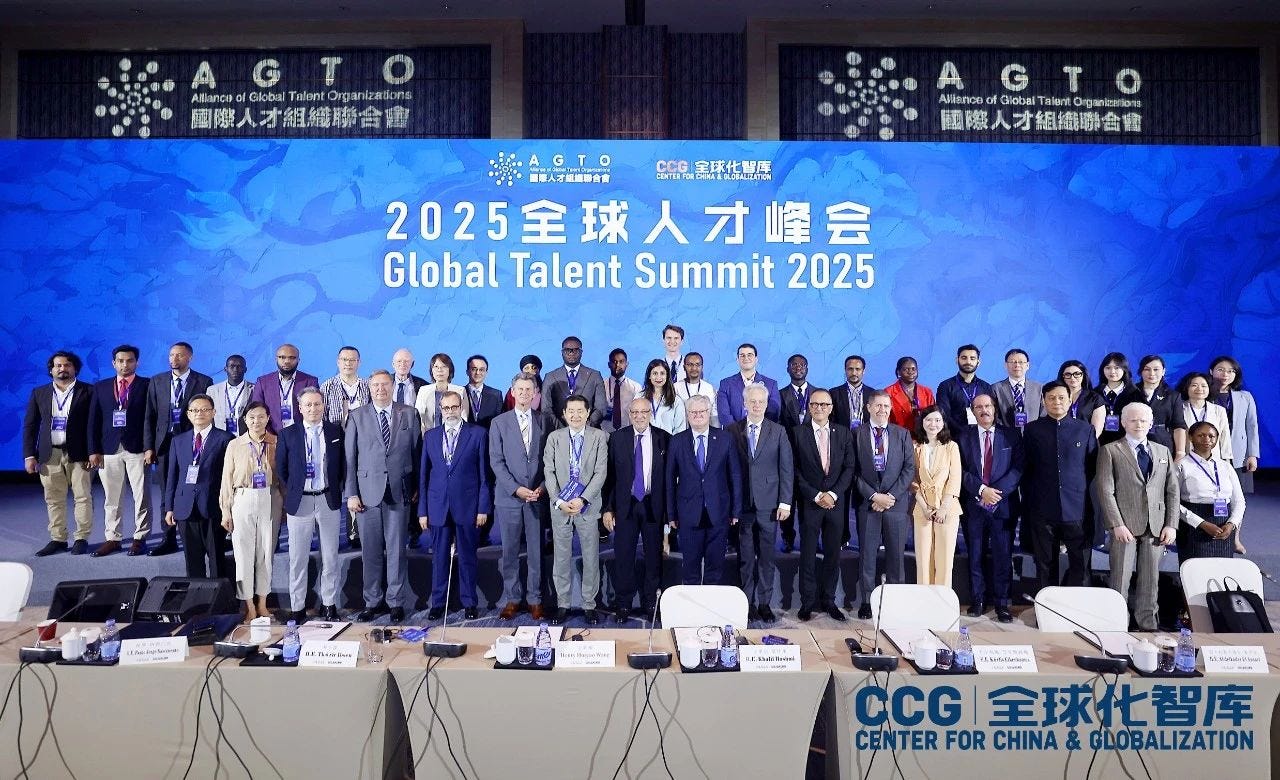
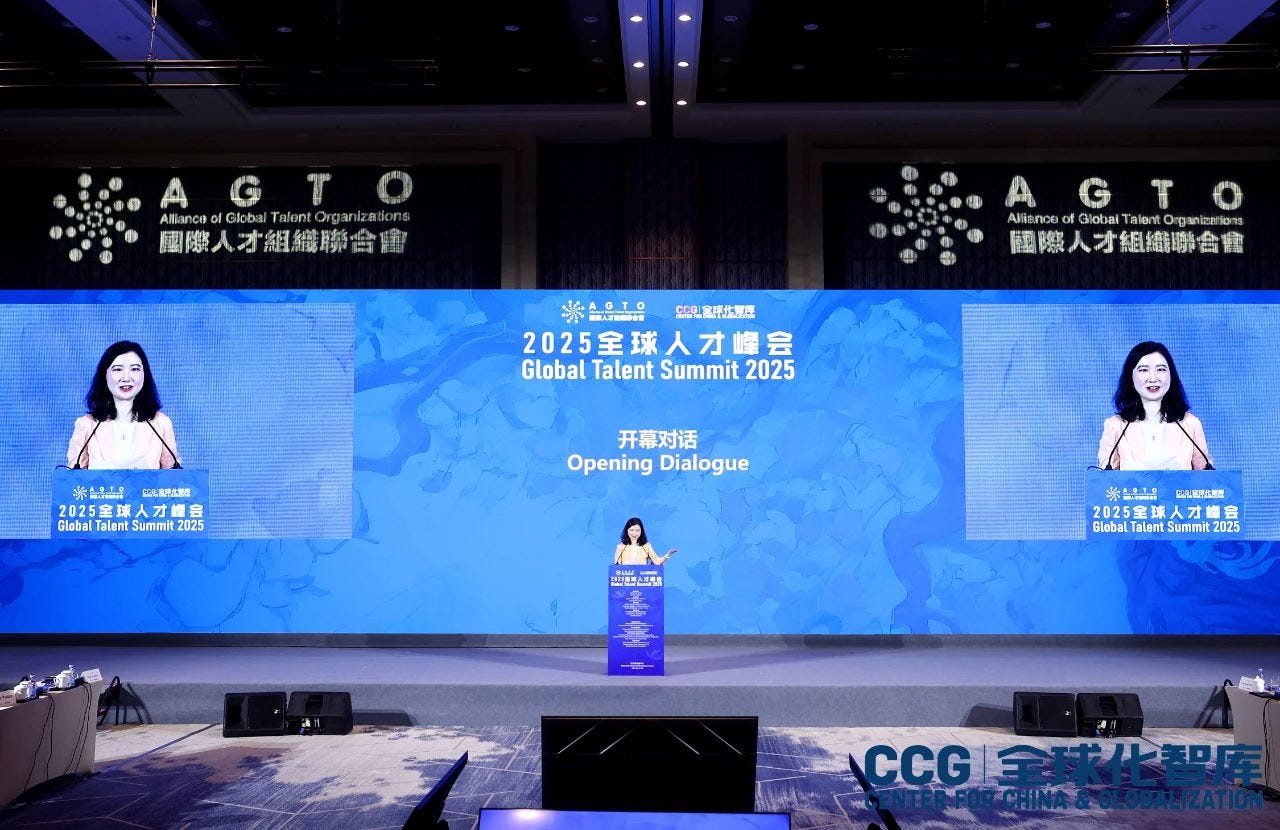
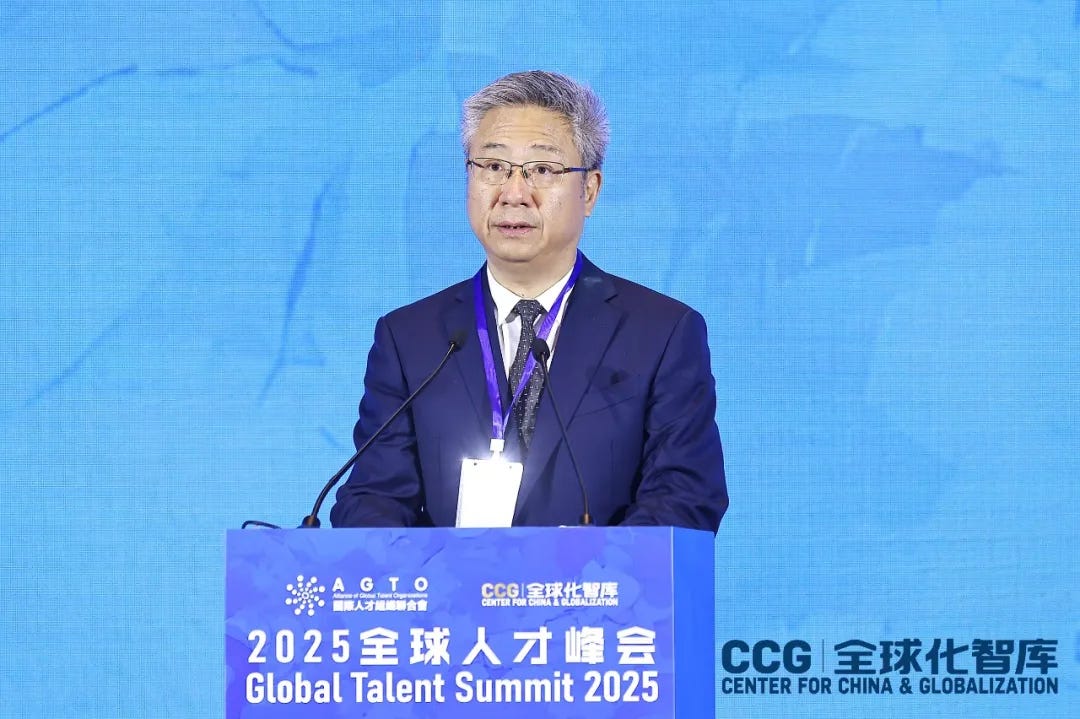
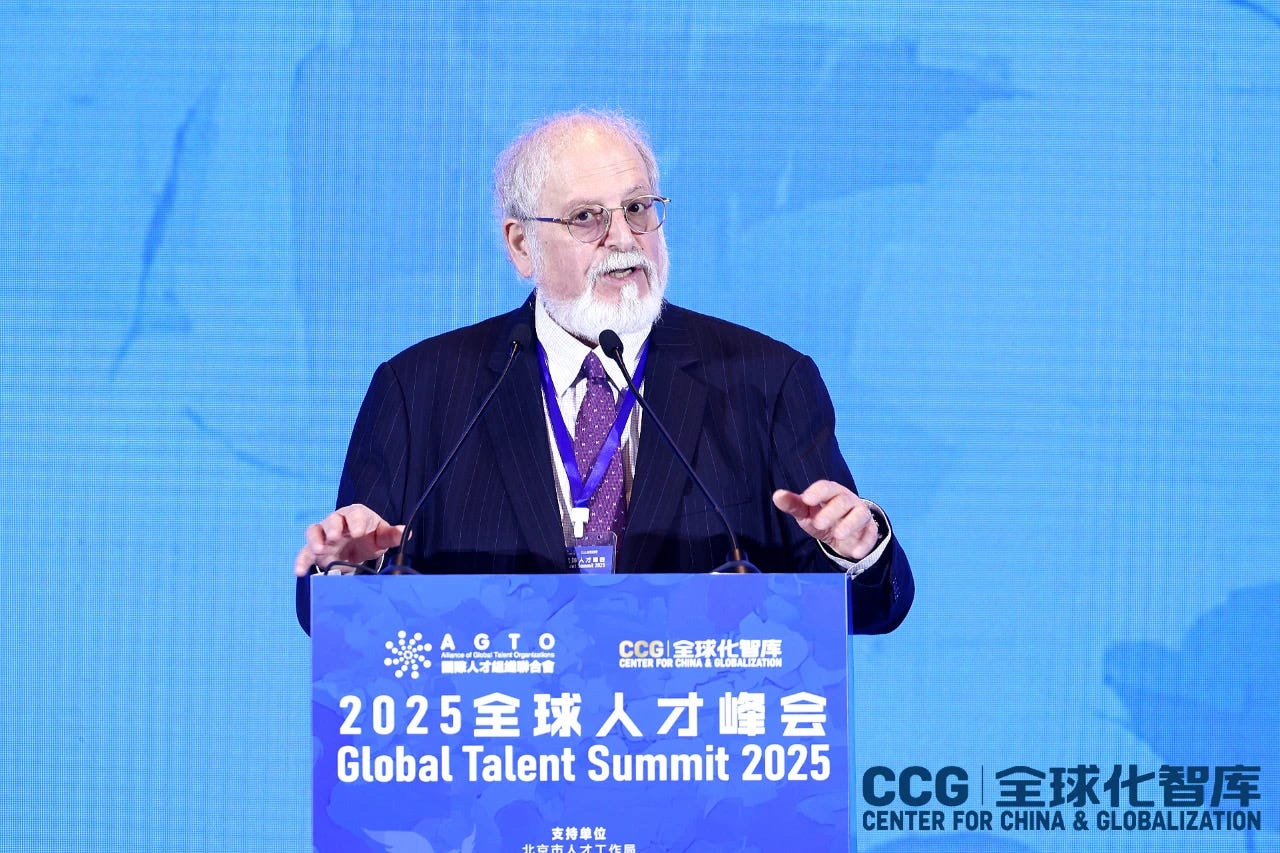
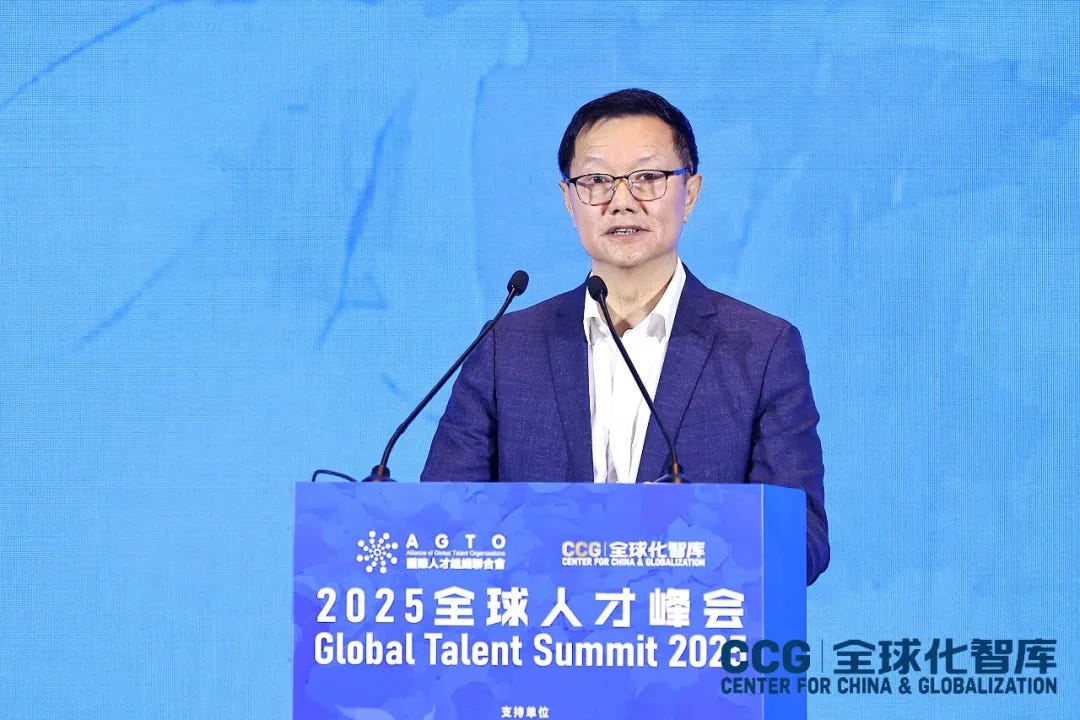
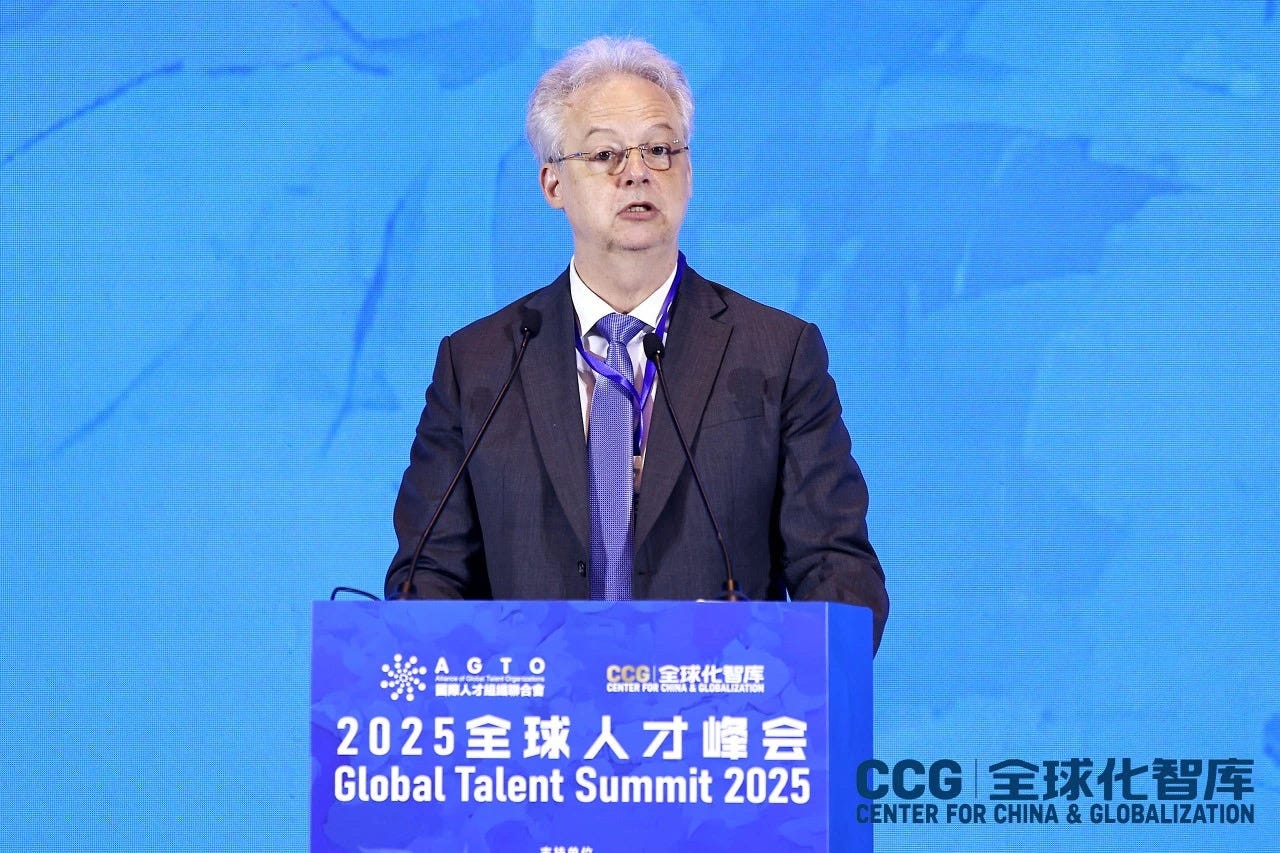
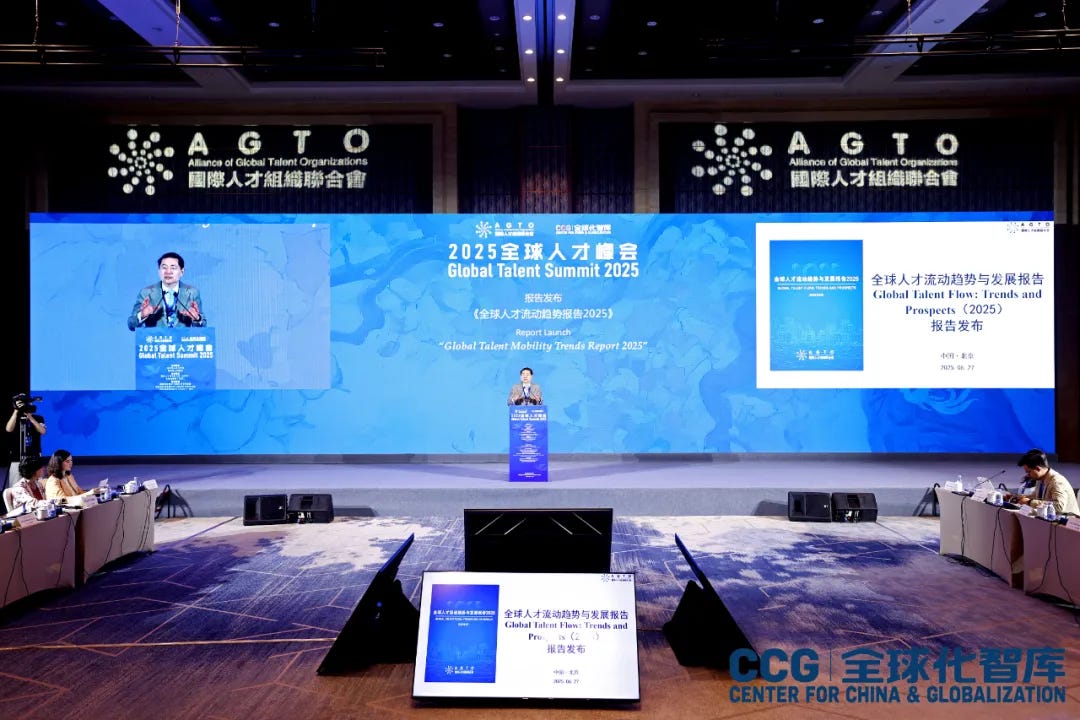
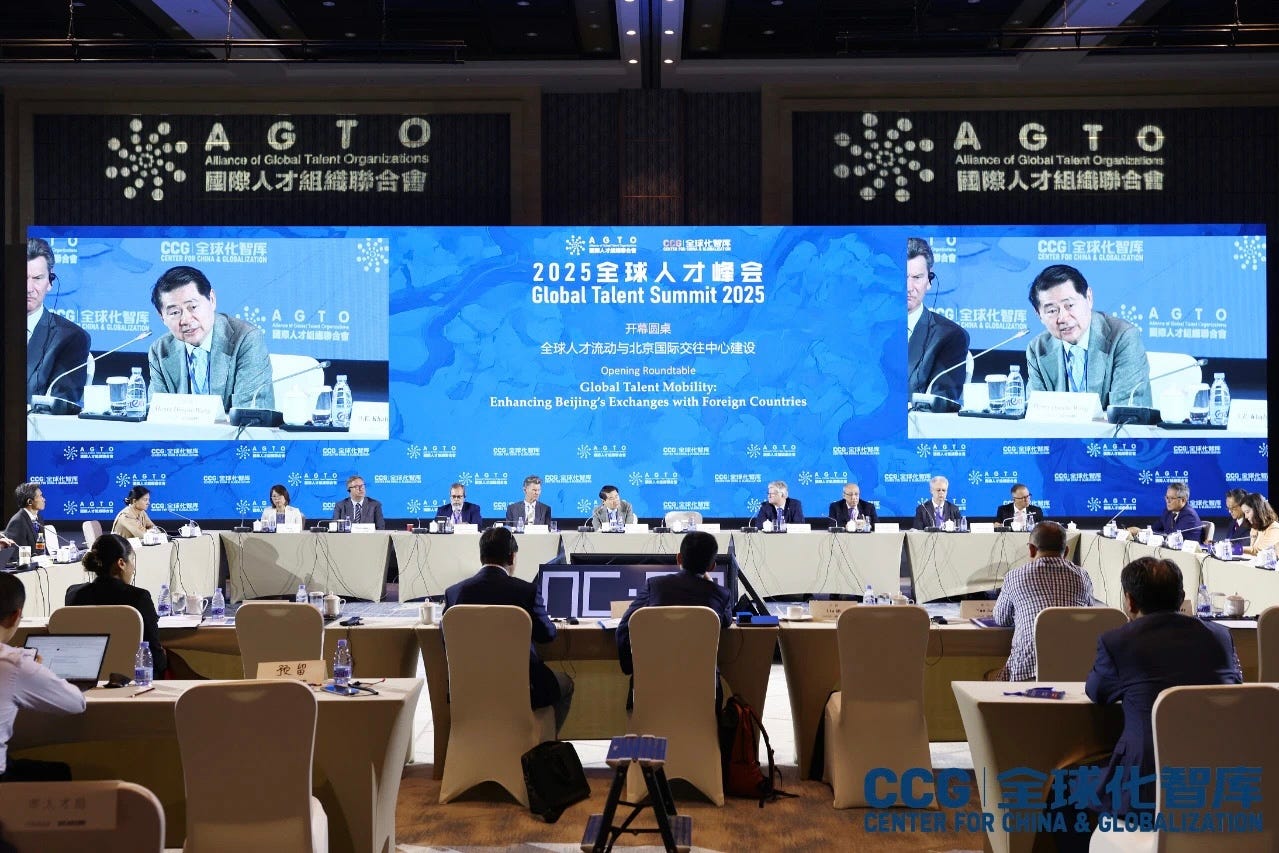
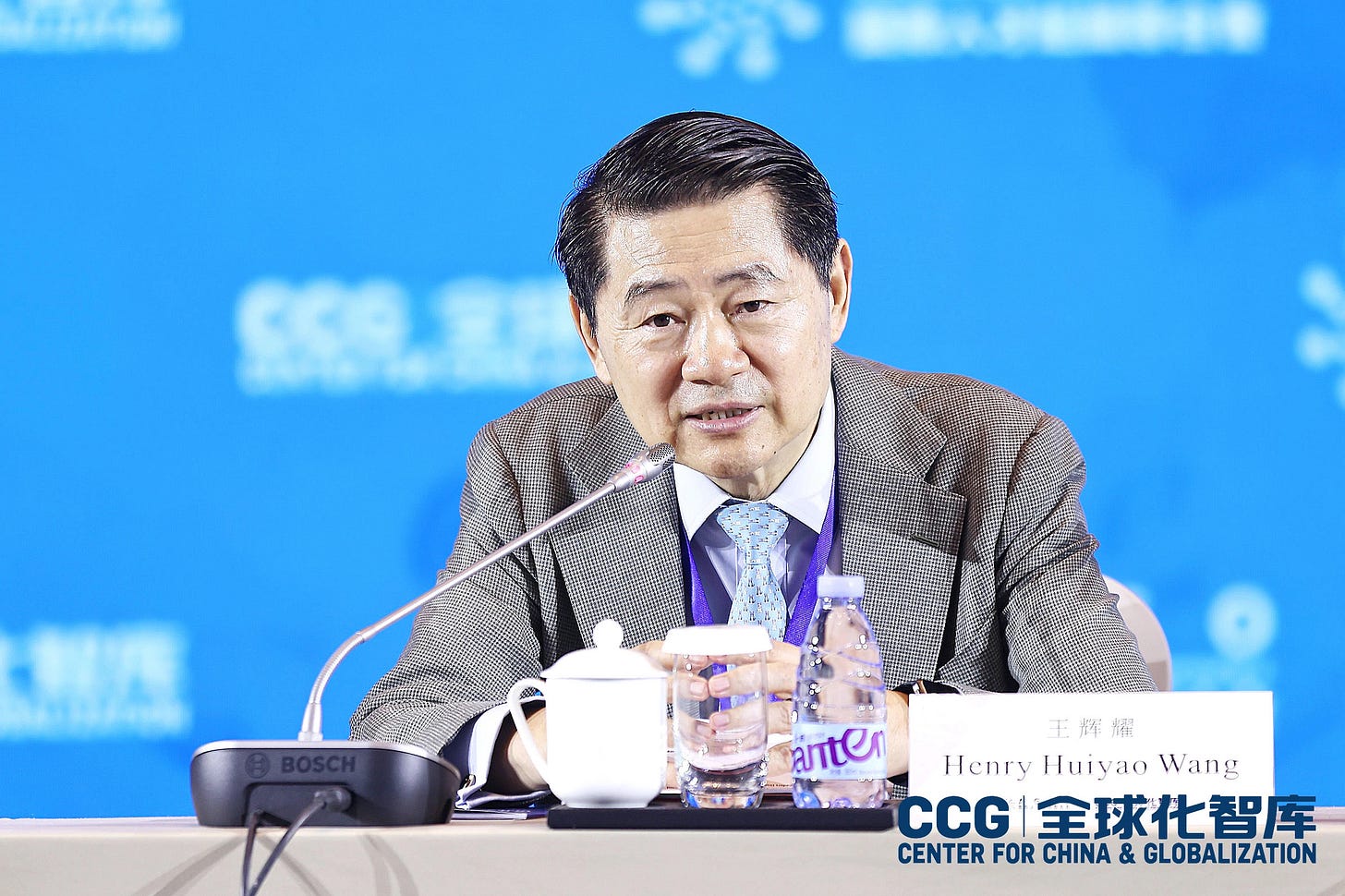
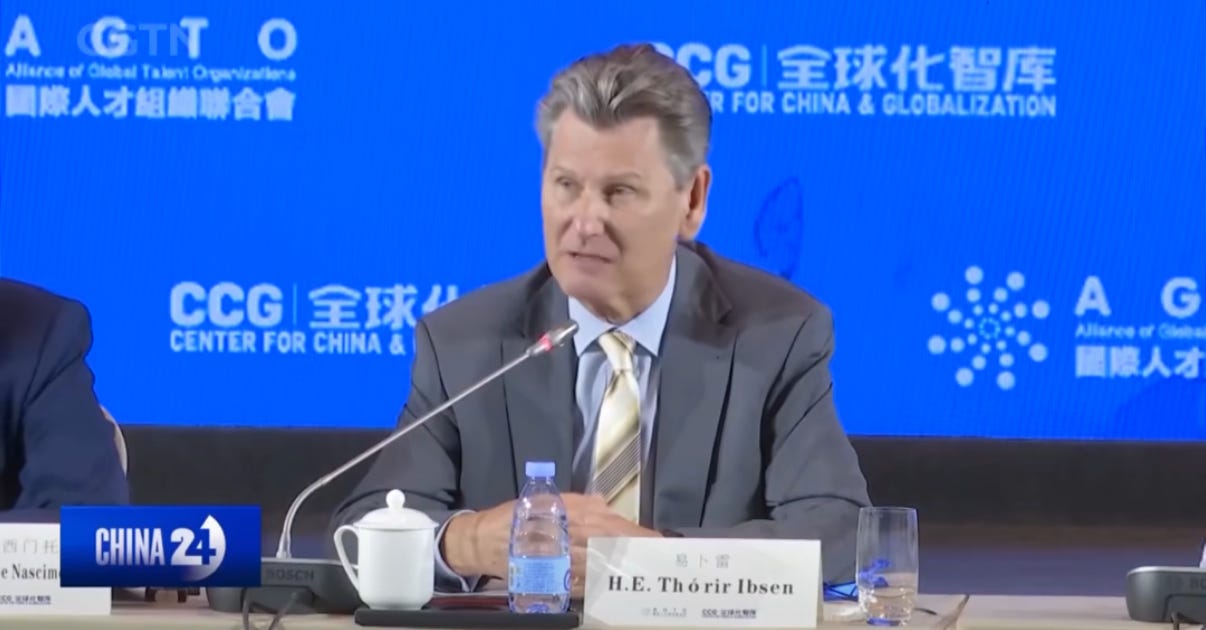
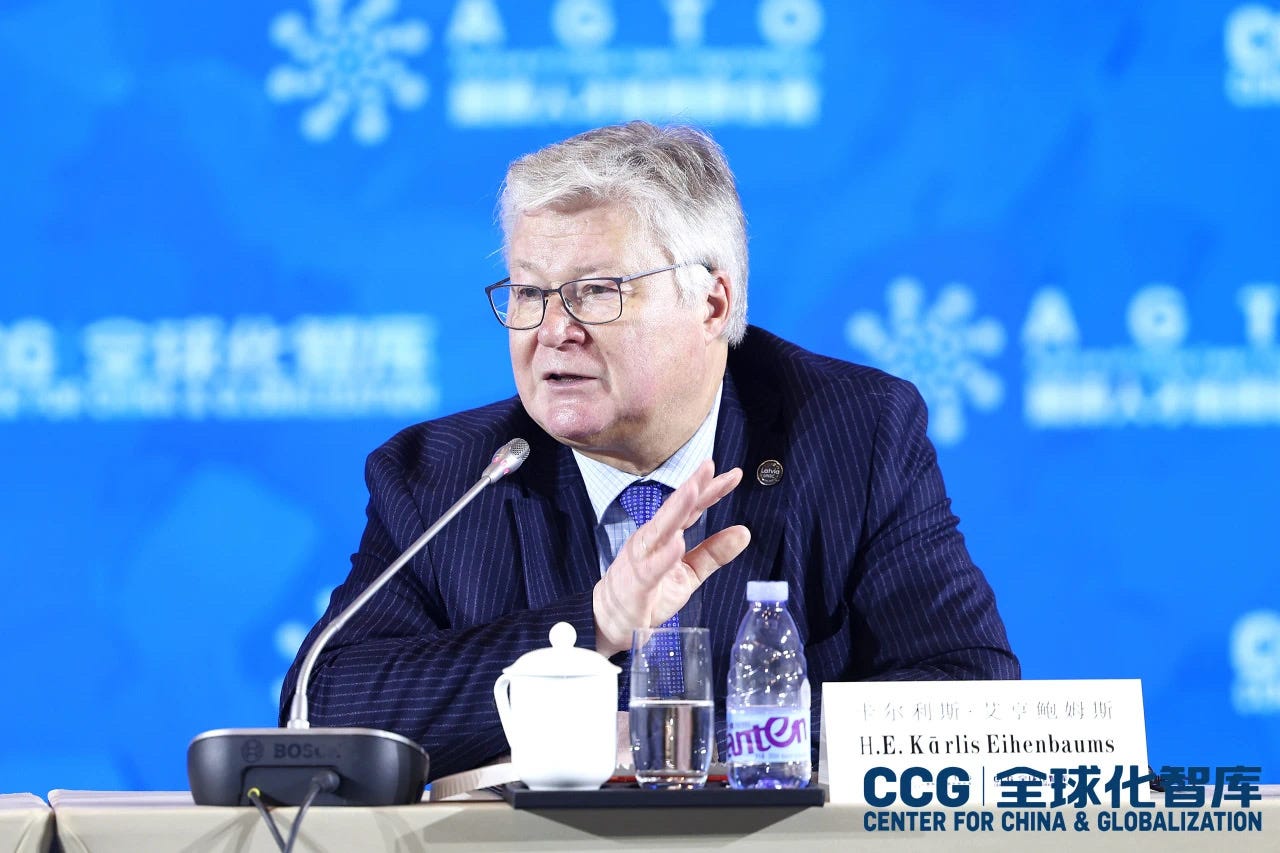
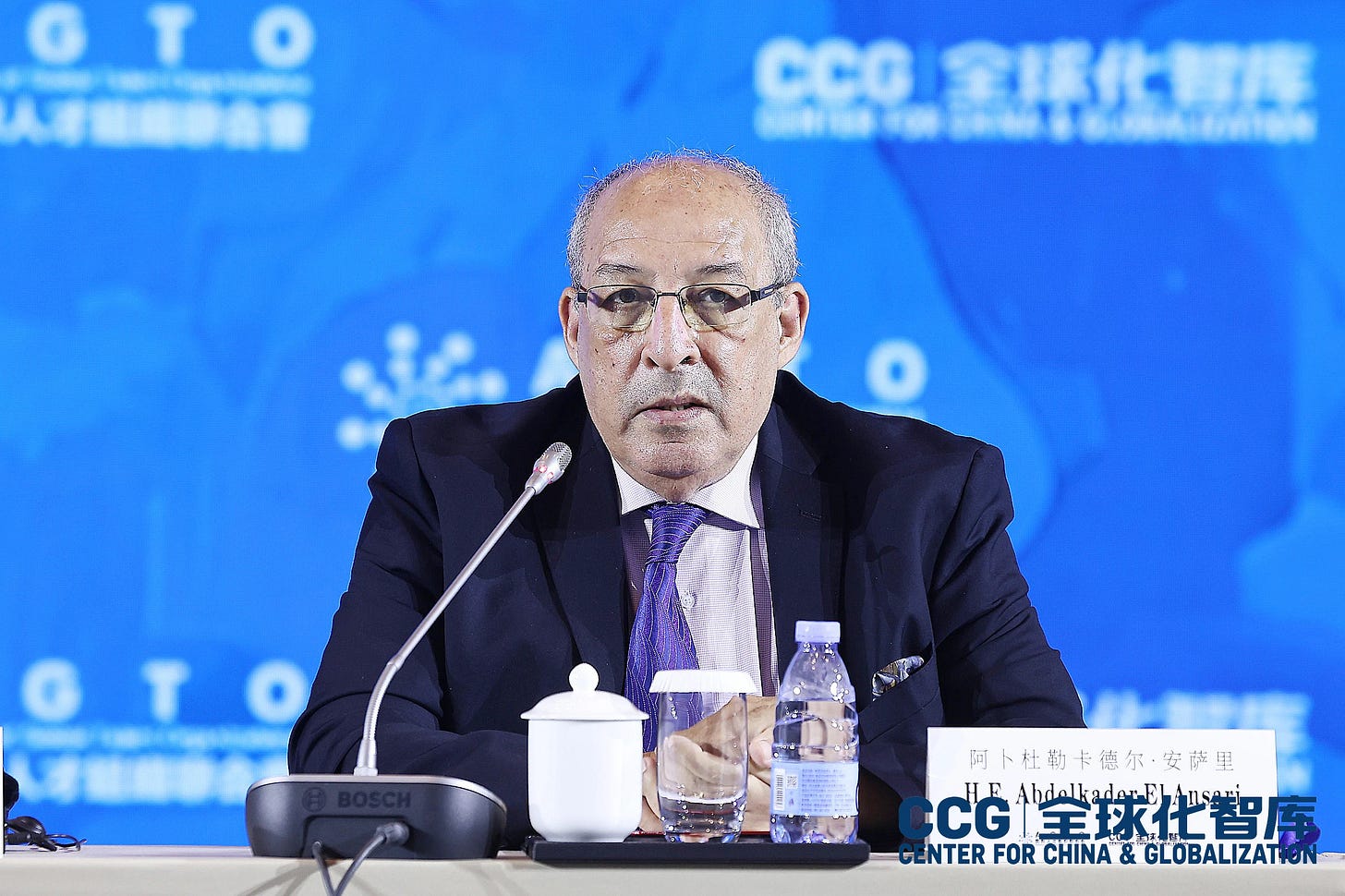
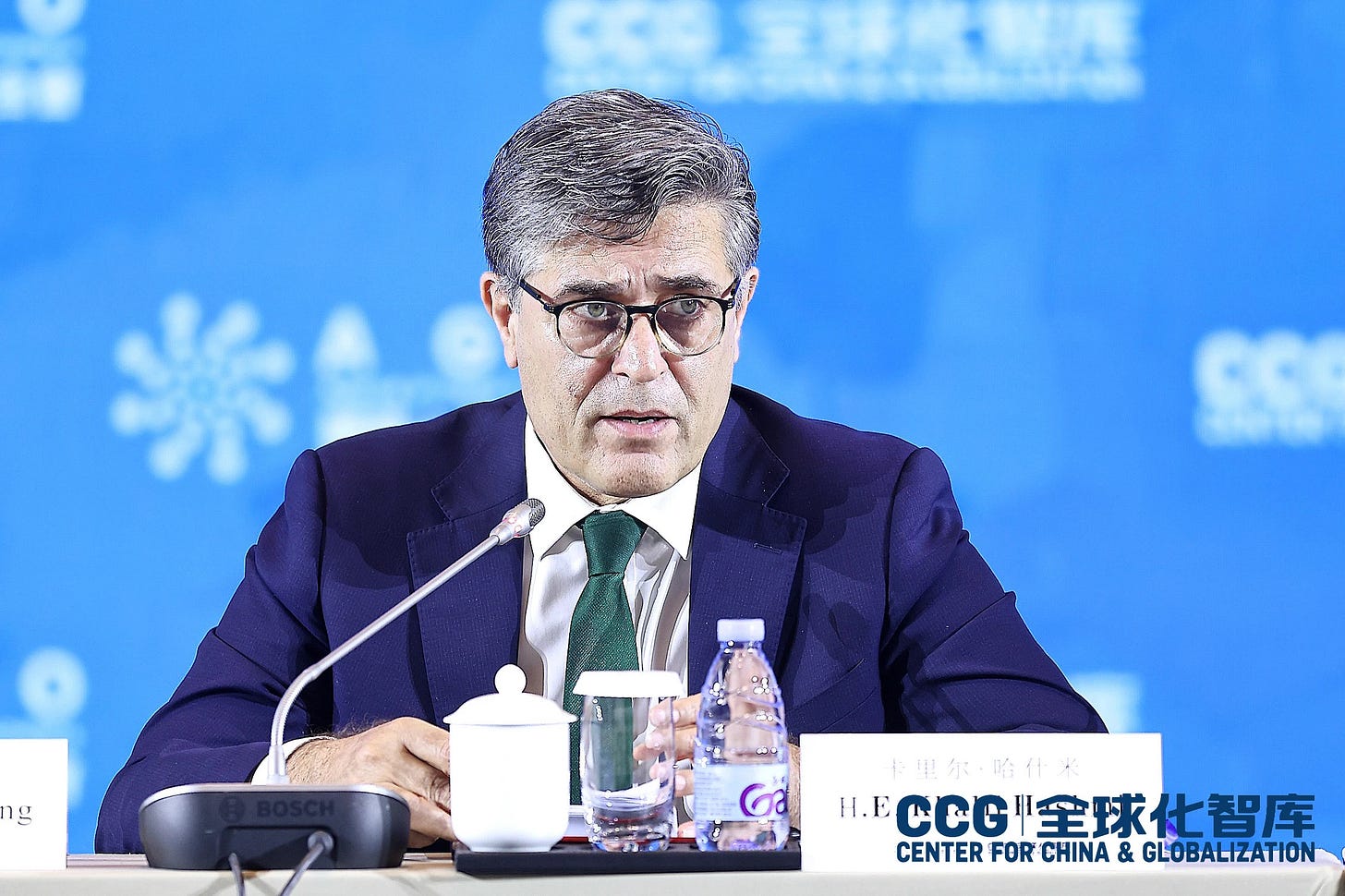
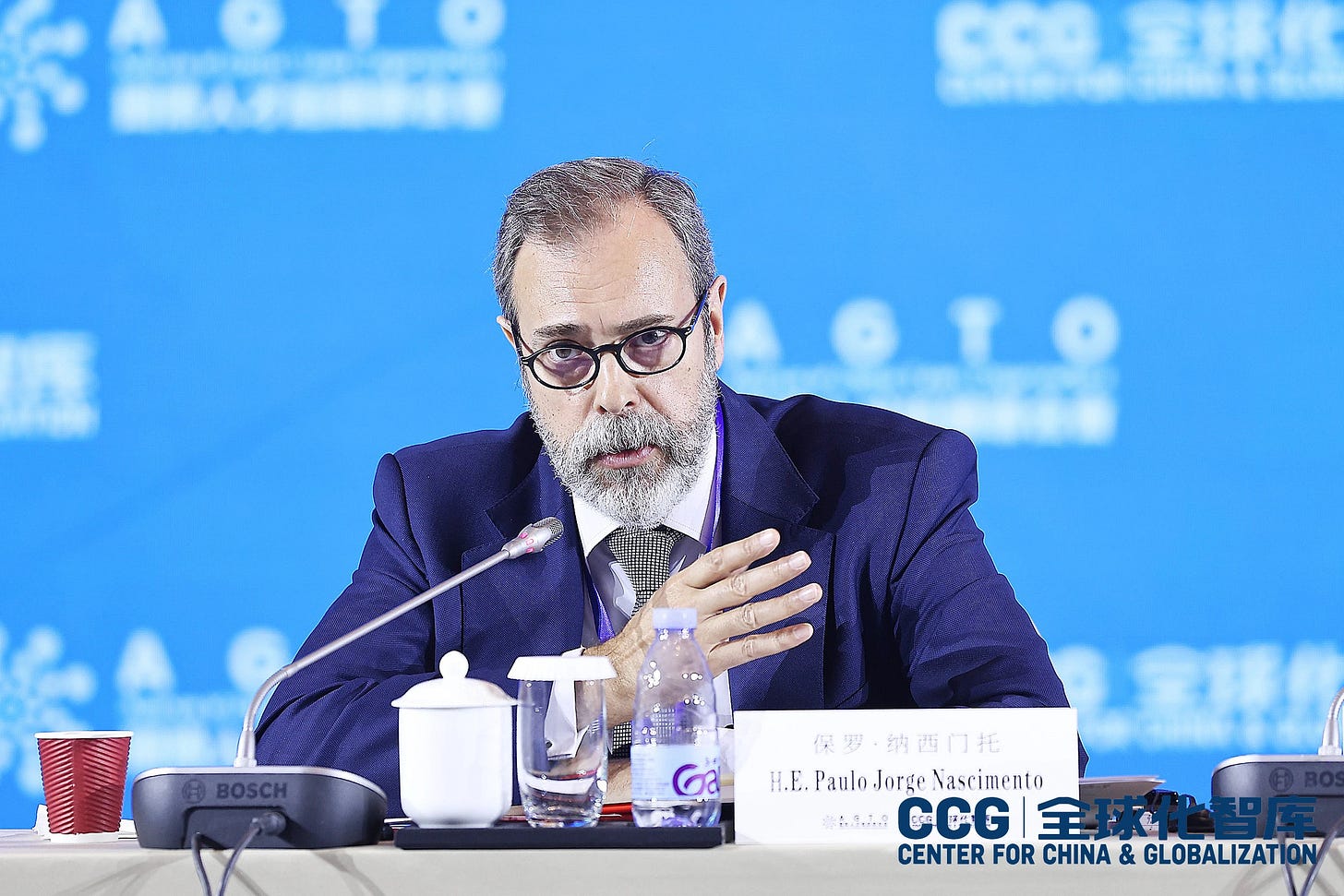
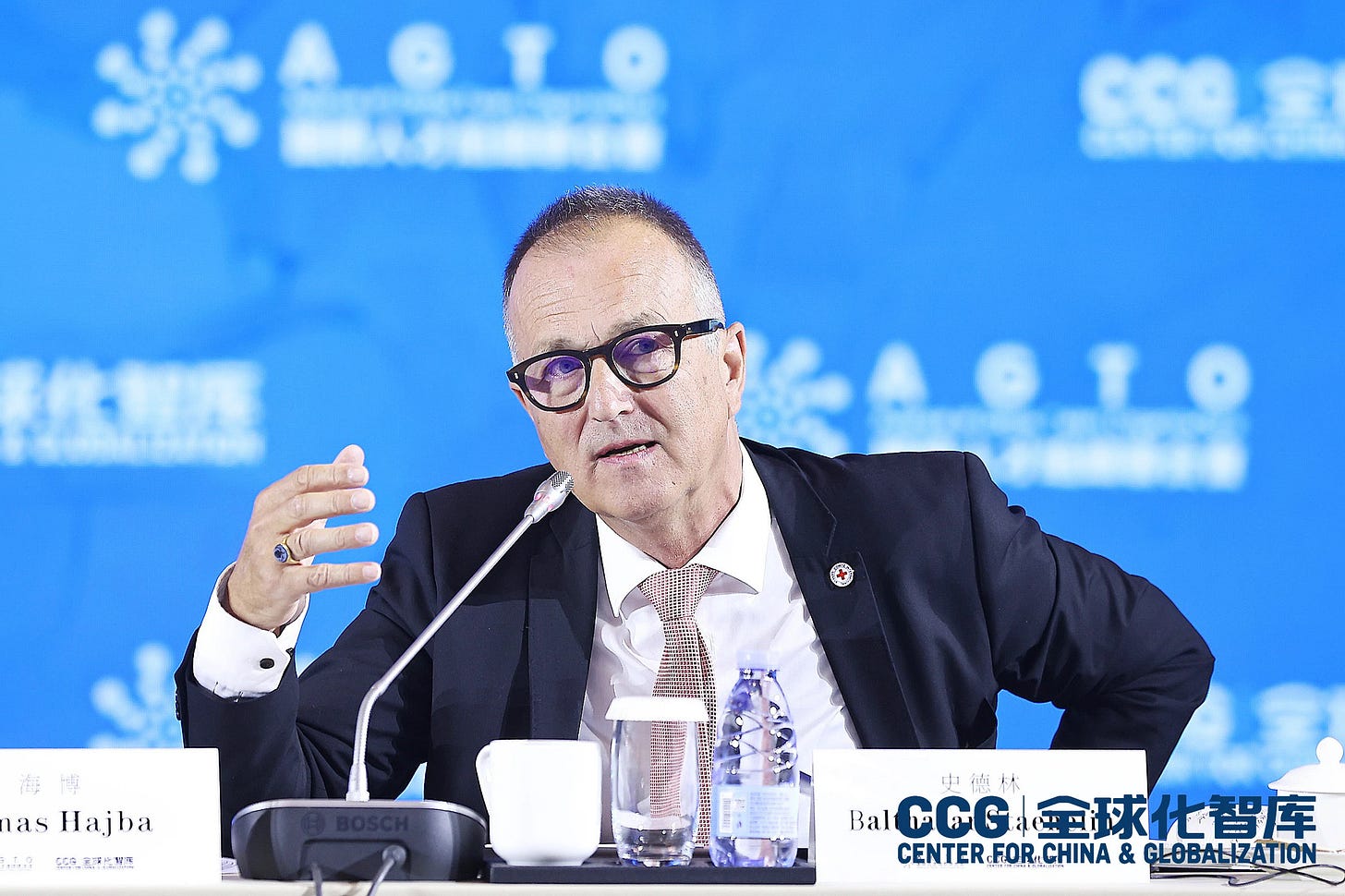
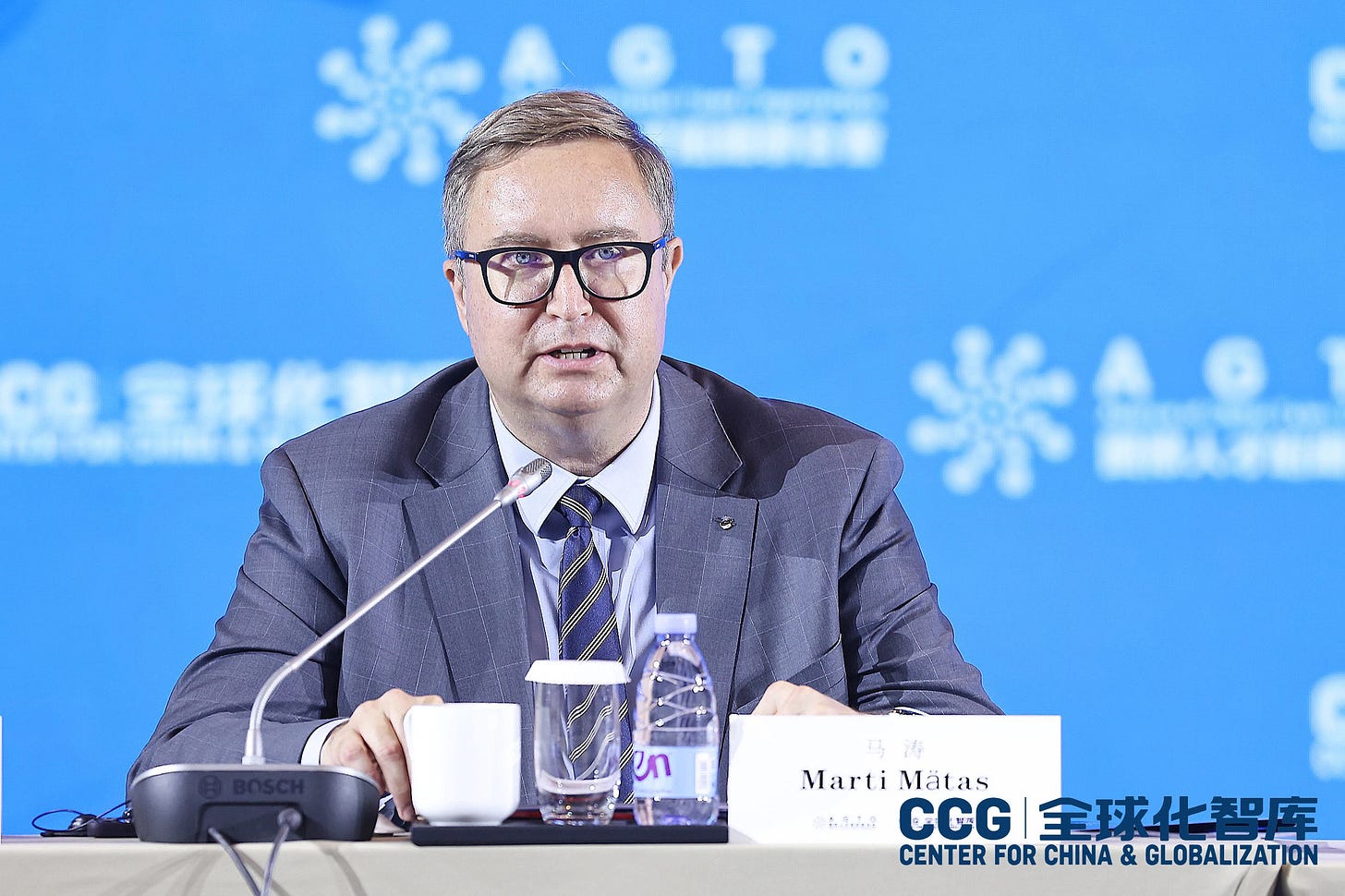
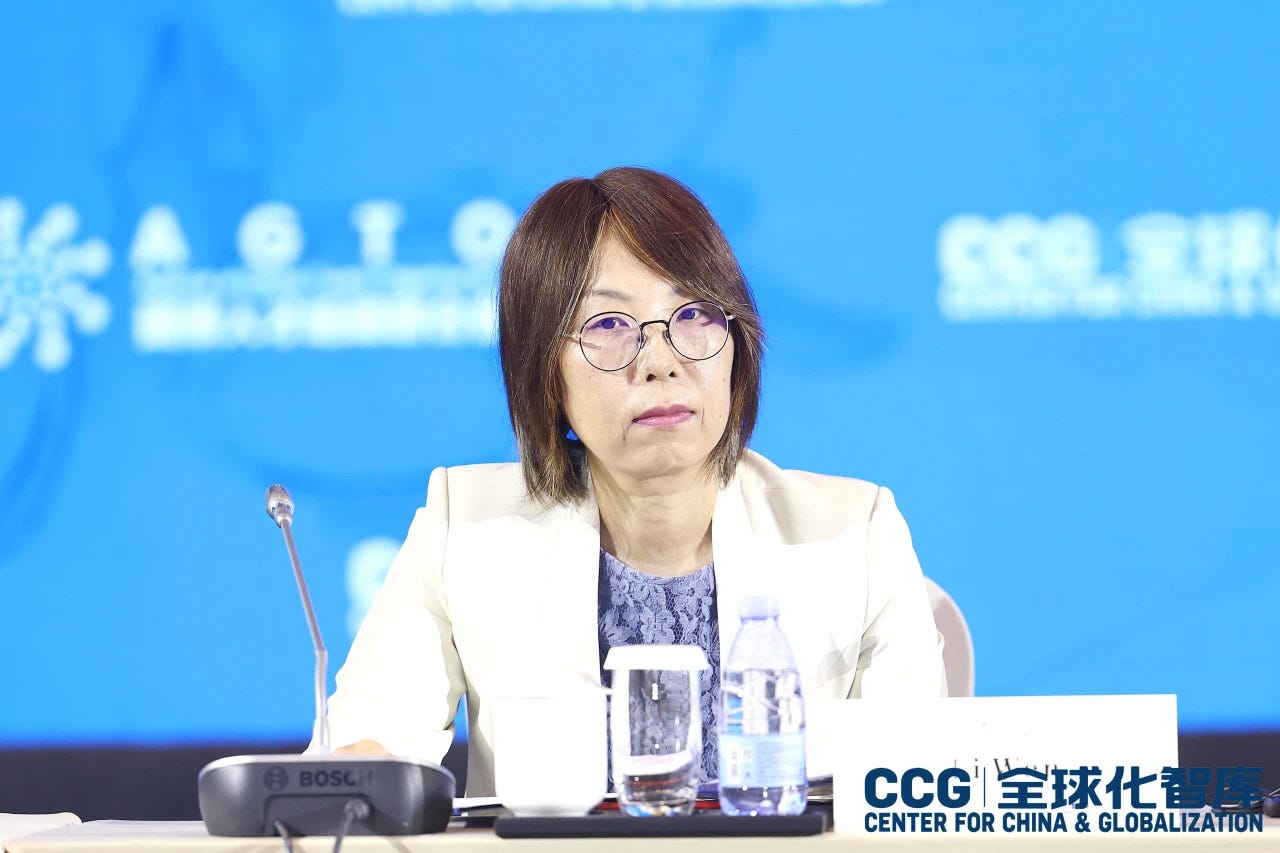
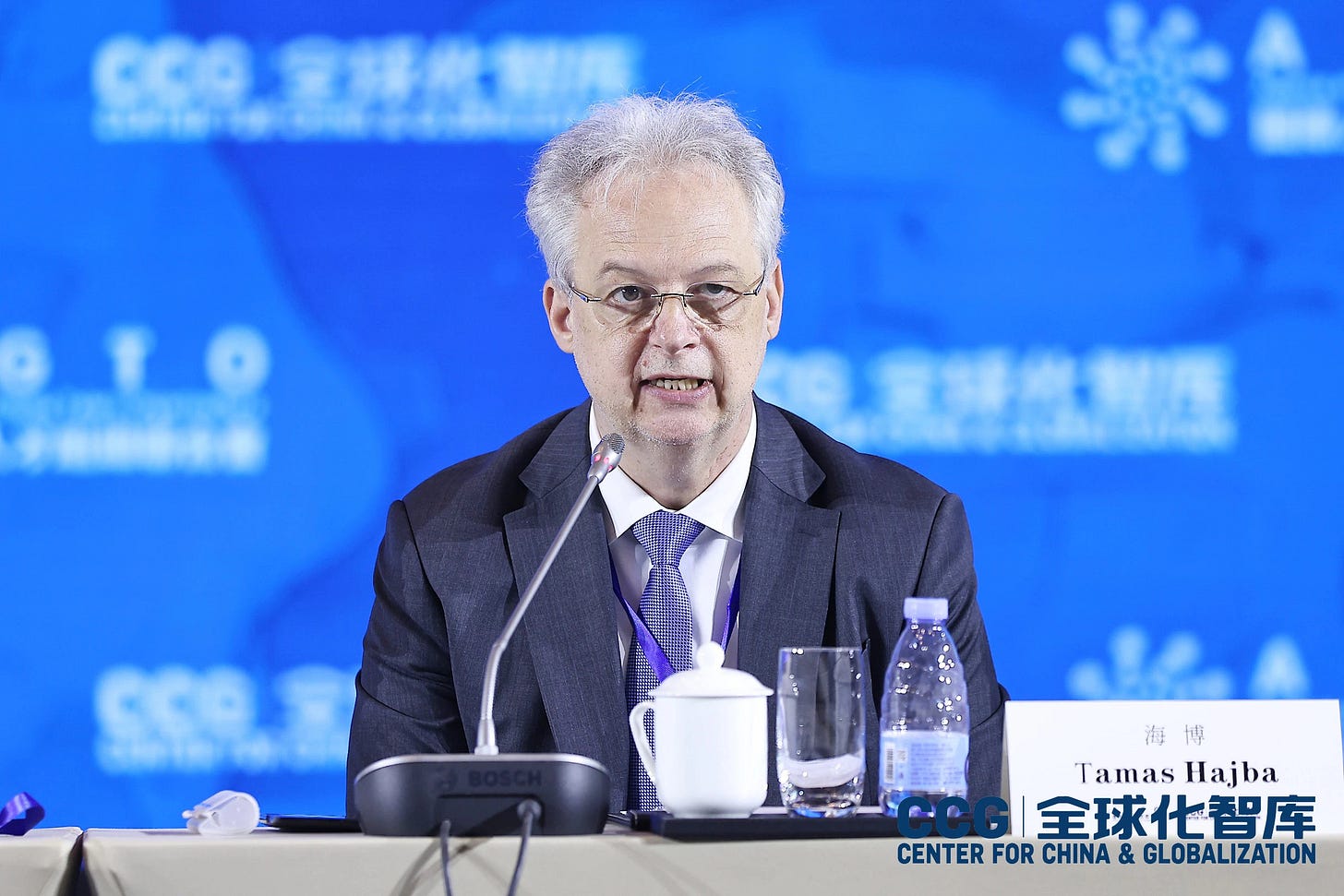
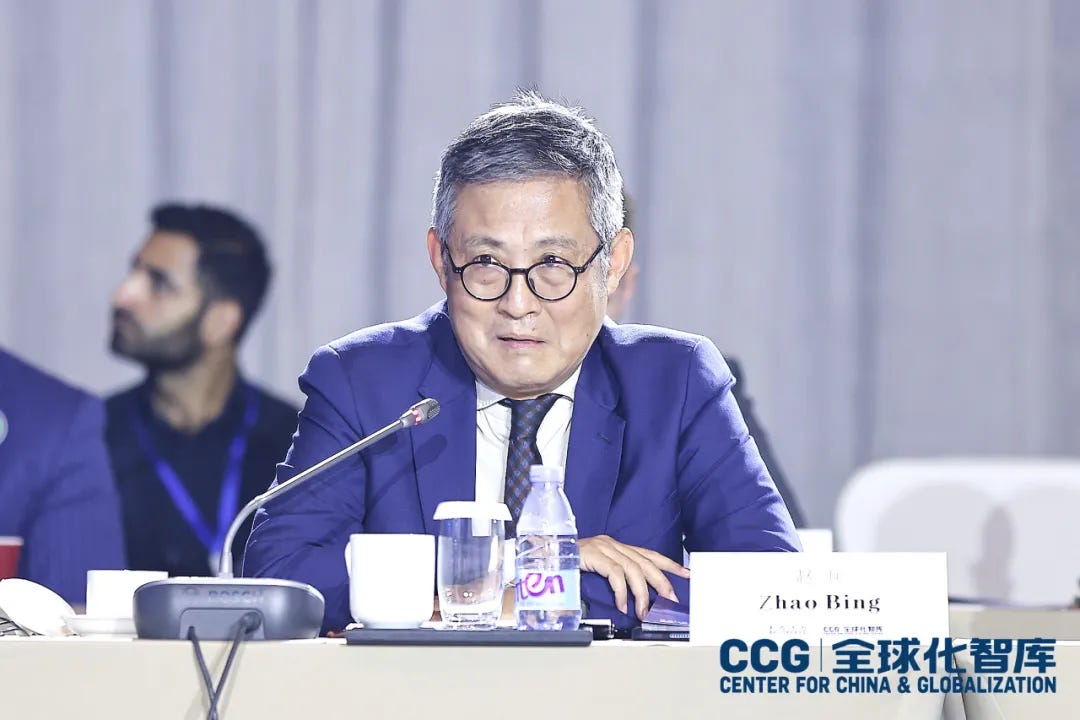
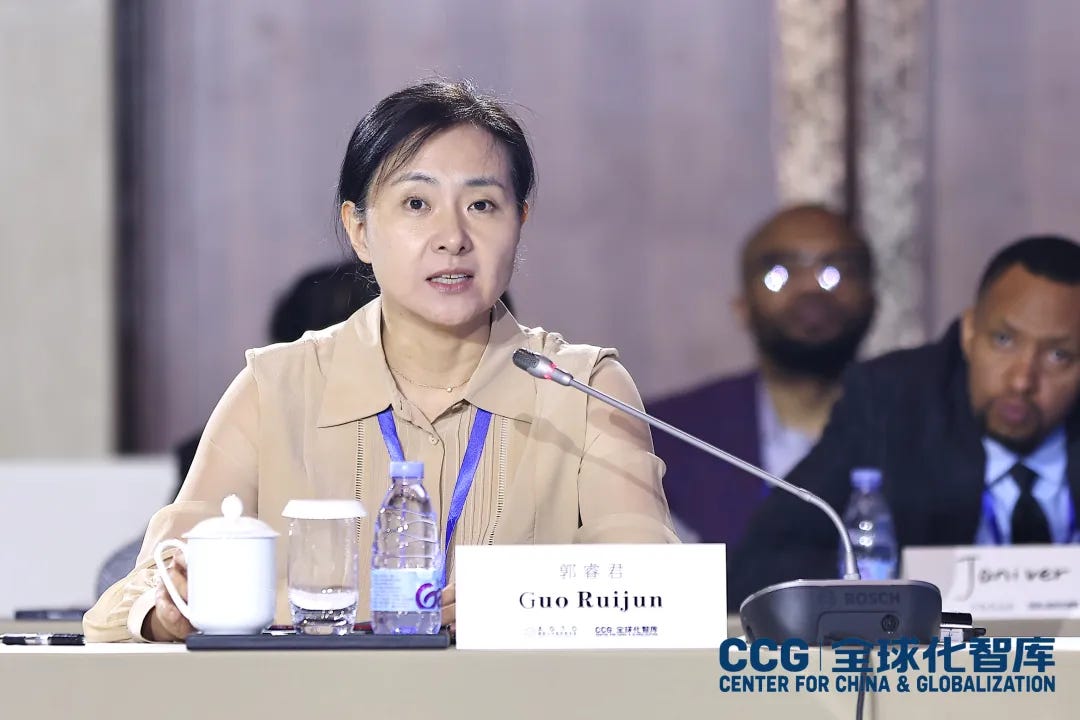
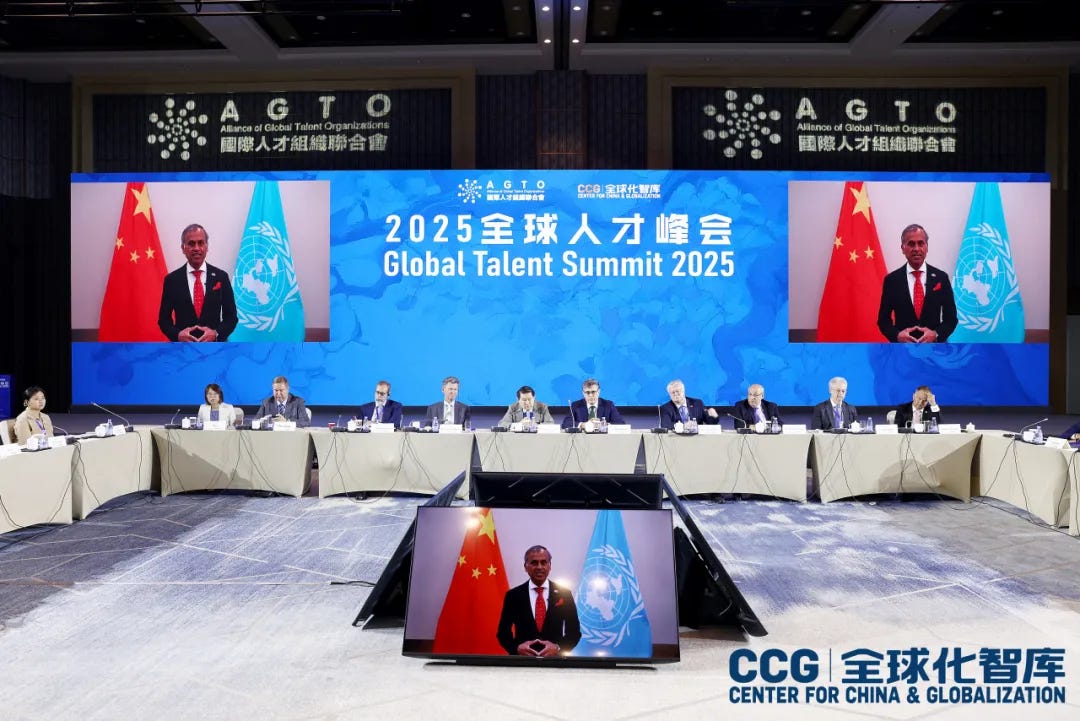
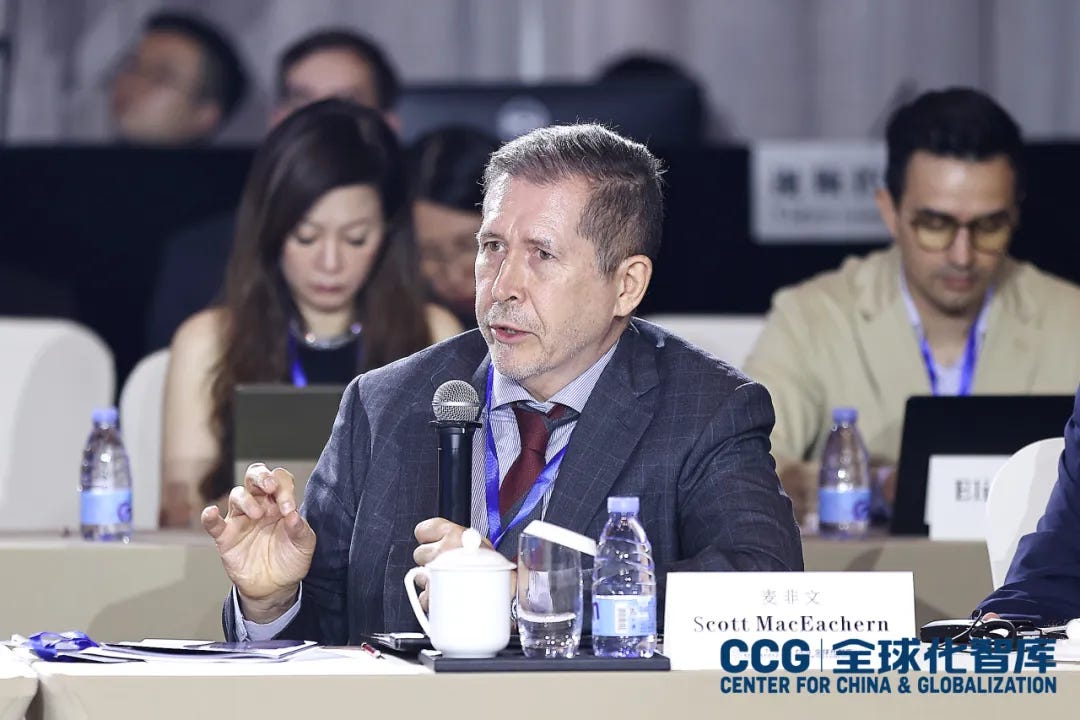

China is a global leader and is fulfilling its global responsibilities.